Trees That Last
Certified by the International Society of Arboriculture
30+ Years of Experience
Competitive Quality
Request a Call Back
Hero Request Form
Thank you for contacting us.
We will get back to you as soon as possible
Please try again later
Our Arborists in Carlisle, PA and Beyond Care About Your Trees!
At Woodlawn LLC, we love trees, and we want to share that fascination with you. Here's a list of some of our favorites. Call our team today to see why we're the arborists Mechanicsburg, PA and the surrounding areas count on!
Do You Crave Shade?
Call now to find out what shade tree is best with help from our certified arborist
(717) 254-4884
Reviews
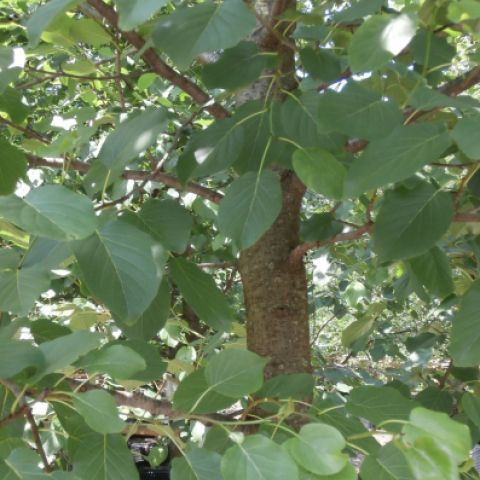
Alder (Italian)
Alnus Cordata
Native to the island of Corsica as well as southern Italy, the Italian Alder, or Alnus Cordata, is best known for its beautiful foliage that glistens lush and green even during drought conditions. The bark and branching structure provide striking winter interest. Durable and trouble-free, the Italian Alder is well-suited for even the most difficult soil conditions and is underused in this regard, being one of our best drought-resistant trees. It normally grows 40 feet to 50 feet high and can grow almost an equal width.
You may want to position your Italian Alder so as to accent the pyramidal shape during the dormant season. Placing it against the sunset horizon is one good choice. Because the foliage remains a lush green into the autumn, blending it with brilliant fall-color trees provides a pleasing contrast. It's a wonderful addition to any garden!
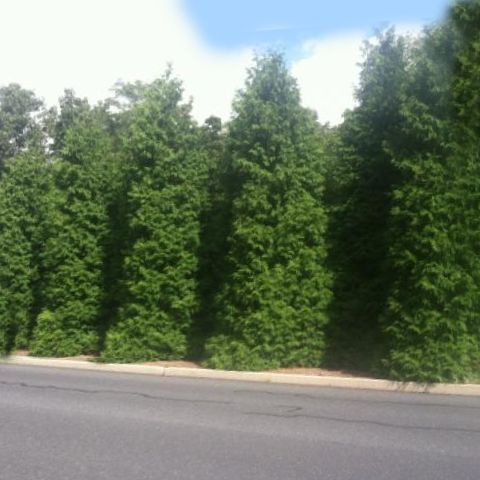
Arborvitus "Green Giant"
Thuja x "Green Giant"
This Green Giant is elegant and formal with a symmetrical, spire-like growth habit. In general, it's a trouble-free choice that performs best in full sun. The Arborvitus can be 40 feet to 50 feet tall and 12 feet to 14 feet wide. You can use this species as a windbreak or for screening.
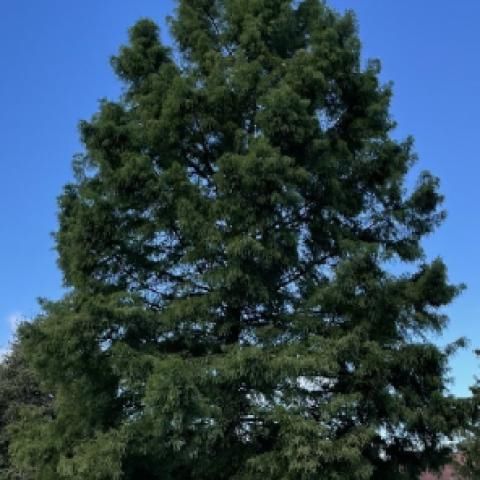
Bald Cypress
Taxodium Distichum
Although native to the southeast, this tree is hardy enough for northern Maine! The Bald Cypress, or Taxodium Distichum, grows in swamps and can thrive in year-round flooded areas, but it also survives in dry and compacted soils. Like the Dawn Redwood and Larches (it is in the same family as the Dawn Redwood), the Bald Cypress is a deciduous conifer, shedding its needles every autumn. The fall color is a pleasing orange, and the reddish to grayish brown bark contributes to winter interest. It grows 60 feet to 70 feet high and 25 feet to 30 feet wide.
Taxodium Distichum is a specimen tree with unique features, not the least of which are the protruding "knees" that grow around the tree in highly compacted or wet soils. These are areas, in fact, where few other tree varieties would thrive, much less grow additional features. The "knees" are very attractive, especially when combined with other landscaping features. Bald Cypress trees constitute an excellent choice for a deciduous conifer for parks or large lawns, especially those near bodies of water.
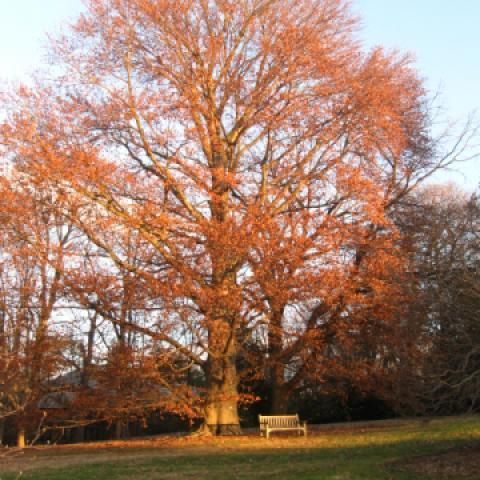
Beech (American)
Fagus Grandifolia
This tree is majestic and durable. With smooth, grey bark and beautiful bronze fall color, the American Beech, or Fagus Grandifolia, grows up to 80 feet tall and 50 feet wide. Beechnuts mature in the fall and are edible.
The obvious use for American Beech is as a specimen. However, utilizing it in groupings with other conifer evergreens is very attractive as well. Another option is to plant a grove of only American Beeches for a truly awe-inspiring scene. The foliage is especially beautiful in spring and fall, and the silver-gray trunks also provide beautiful winter interest as well. This species is perfect for use in large parks and lawns where the noble outline can be best appreciated.
While not unreasonably demanding, American Beech is not a tree for either extremely dry or heavy clay soils. Drainage is important since soil compaction will kill Fagus Grandifolia.
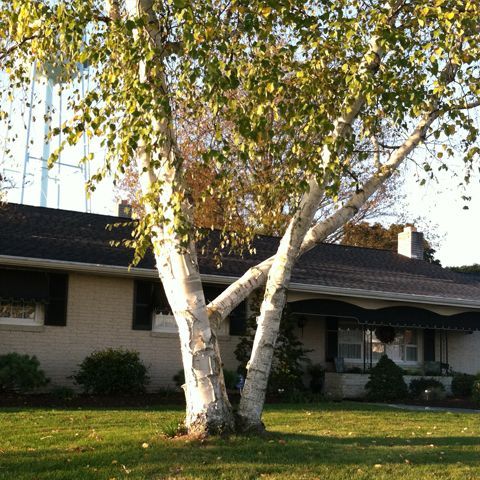
Birch
Betula
At Woodlawn LLC, we love Birches! Our favorite may be the Paper Birch. The bark is such a pure white, and the fall color such a rich yellow. Just imagine multi-stem groves in our northern hardwood forests! Unfortunately, we're simply too far south for Paper Birch to flourish.
There is good news, though! For those of us in the mid-Atlantic region, Betula still has much to offer. If you are dreaming about the white-barked Paper Birch, we can get you close with some of the cultivars of River Birch. "Heritage" is an old favorite, and some of the newer cultivars are even better. We currently have "Dura-Heat" River Birch which, in youth, has bark almost as white as Paper Birch. As the name suggests, this cultivar is very heat-tolerant, thriving as far south as Atlanta, GA! We have another River Birch cultivar called "City Slicker" in production. "City Slicker" is every bit as heat-tolerant as "Dura-Heat" with bark that is at least the same shade of white, if not even purer. As far as soil considerations, River Birch does well in all but the driest soil.
When we can look past our white-bark obsession, we'll notice a couple of other Birches worthy of consideration: Sweet Birch and Yellow Birch. These two Birches will outperform River Birch in dry locations, and Sweet Birch has phenomenal fall color and glossy copper stems in youth. Yellow Birch fall color is almost as stunning and the stems of young Yellow Birch can be a rich yellow-gold. Neither of these trees has any significant insect or disease problems.
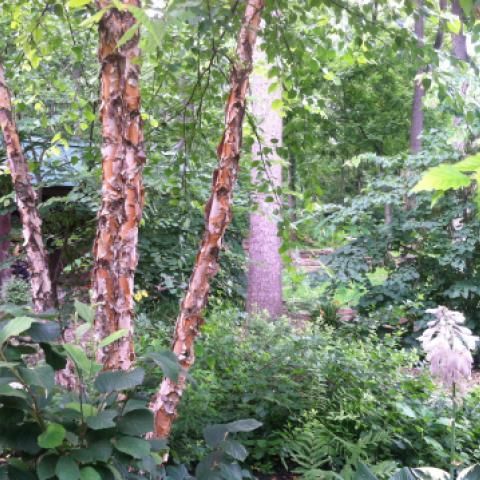
Birch (River) "City Slicker"
Betula Nigra "City Slicker"
The River Birch, or Betula Nigra, is a reliable, vigorous performer and one of the most adaptable and trouble-free members of the genus Birch. The River Birch "City Slicker" cultivar (Betula Nigra "City Slicker") has lighter bark and improved resistance to urban conditions.
River Birch is native to stream banks in the eastern deciduous forest. In the wild, it usually grows with multiple stems; however, single-stem specimens are less susceptible to breakage when mature. The cream-colored bark of the young tree ages to a pleasing scaly salmon color. Often planted without enough consideration for its rapid growth and potential large size, this tree usually reaches 50 feet in height with a 40-foot spread. The fall color is a respectable yellow. River Birch "Dura-Heat" is resistant to Bronze Birch Borers and Birch Leaf Miners, but it may become chlorotic in high pH soils.
One of our favorite companion plants for this tree is the Sweetbay, especially the "Moonglow" cultivar. The glossy, broad-leaf, semi-evergreen leaves of the Sweetbay enhance the year-round appeal of the River Birch bark. Consider plant shrubs with red and/or orange fall color beneath the River Birch to accent the bark and the fall shades. For a backdrop, use dark green conifers such as Oriental Spruce and Nordmann Fir.
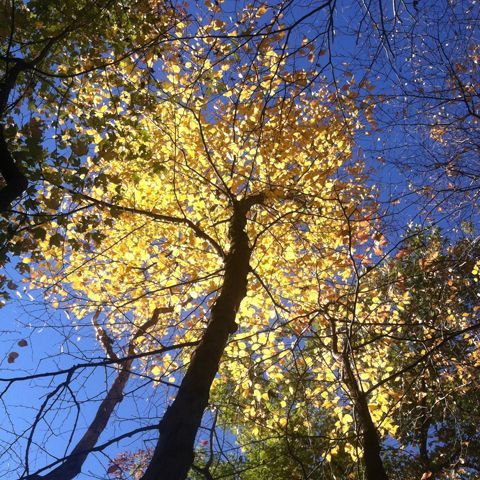
Birch (Sweet)
Betula Lenta
The Sweet Birch, or Betula Lenta, thrives high in the mountains often in dry, difficult conditions. Common in the wild, it is rarely offered in nurseries. People often focus on Birch trees with showy bark at the expense of the Sweet Birch. However, the rich summer foliage and golden fall color are reasons enough to invest in this fine tree. The Sweet Birch shows high resistance to Bronze Birch Borers and Birch Leaf Miners as well as tolerance for urban conditions and difficult growing sites. Also, the stems give off a pleasant wintergreen aroma when they are bruised as an interesting side note. Betula Lenta is also a long-lived tree with the oldest known specimen dated at 368 years old. It grows 40 feet or 50 feet high.
The Sweet Birch puts on an unrivaled fall show and should be planted where this can be fully enjoyed, such as among evergreens or other deciduous trees with orange and red fall color. A restful landscape scene often requires a mixture of both flamboyant and unassuming trees.
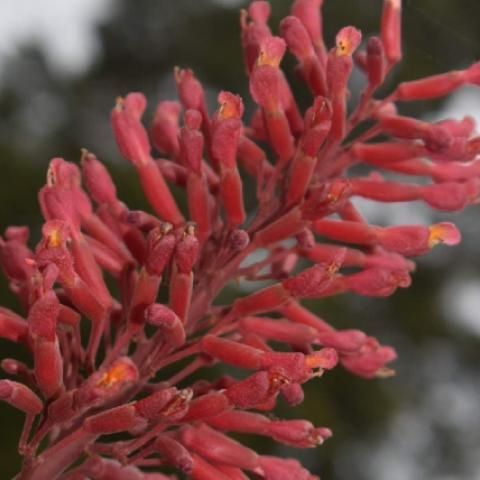
Buckeye (Red)
Aesculus Pavia
Blooms are king on the Red Buckeye or Aesculus Pavia! The emerging blossoms are pink but develop into brilliant red flower clusters by May. Formed of individual flowers that are 1 inch to 1.5 inches in diameter, these attention-grabbing flower clusters are 6 inches to 10 inches in length. The foliage, with each leaf formed of five to seven leaflets that are between 3 inches and 6 inches long, is a rich green from spring into early summer. By midsummer, however, the Red Buckeye is gradually retreating from the stage, and by early fall, the leaves are brown and shedding. Don’t let that stop you. The spring show of Aesculus Pavia more than makes up for it!
Aesculus pavia is a small tree that grows to about 30 feet high and 20 feet wide. It prefers partial shade in moist, well-drained soil but will tolerate full sun, is pH adaptable, and will grow in a variety of soil types. Use this tree in woodland or naturalized areas as a specimen, along ponds and streams, or in a wildlife garden. With Red Buckeye, the possibilities are endless!
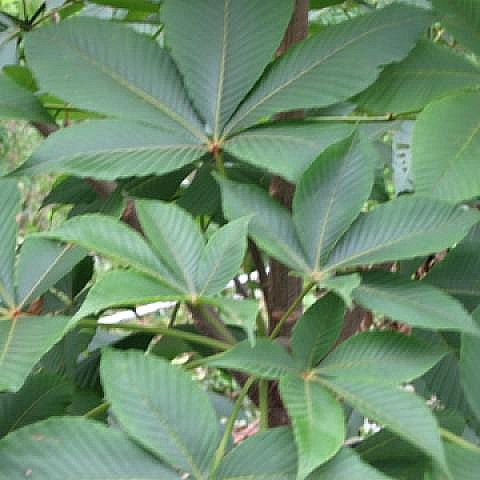
Buckeye (Yellow)
Aesculus Flava
The Yellow Buckeye, or Aesculus Flava, is a lovely, large shade tree with an upright-oval habit and several outstanding traits. The rich green foliage, with each leaf composed of five leaflets that are 4 inches to 6 inches long, is more disease-resistant than most other Buckeyes. The cream-colored flowers of early summer show up after most other plants have finished their floral displays. With irregular, gray-colored plates and bold texture, the bark remains interesting year-round. The largest of the native Buckeyes, Aesculus Flava is widely considered to be one of the most beautiful and trouble-free as well.
The Yellow Buckeye is a tree with an outspoken statement. While it can be placed in a grouping, the best use is as a specimen tree on the front lawn. Yellow Buckeye grows to about 80 feet high and 40 feet wide, and the bold framework forms a majestic silhouette during the dormant season.
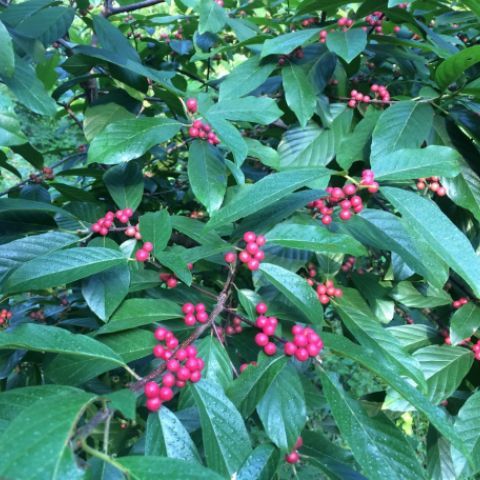
Cherry (Indian)
Frangula Caroliniana
What a fantastic plant is the Indian Cherry or Frangula Caroliniana! Lush foliage, striking late-summer fruit, and brilliant fall color are the ornamental features of this small native tree. The Indian Cherry tolerates difficult growing sites extremely well, and birds love the fruit. The flowers may be visually unremarkable, but you will know when the plant is in bloom! The area around the tree buzzes with activity as each pollinator rushes in for its share.
The Indian Cherry grows 10 to 15 feet tall with an equal spread. Excellent as a specimen anchoring small shrubs and perennials, Frangula Caroliniana should not be crowded with other plants of the same size. You do not want this one hidden in the landscape! Its shade tolerance also makes it useful in a woodland garden or as an understory tree. Plant it with the knowledge that you are contributing to a complex, beneficial biological community.
The Indian Cherry is also sometimes known as the Carolina Buckthorn because it was originally discovered in South Carolina.
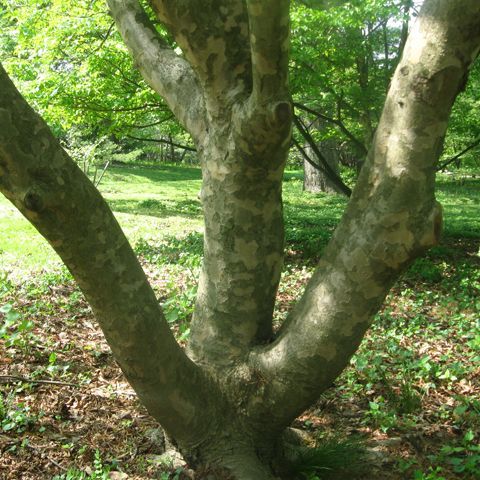
Dogwood
Cornus
Dogwoods are first-rate plants. Is it too much to say that every garden should have one?
This of course begs the question. Which one? By far the most popular Cornus is the Flowering Dogwood. However, we have mixed feelings about this one at Woodlawn LLC. At its best, Flowering Dogwood is a stellar performer in every season, but Dogwoods struggle with insect and disease afflictions that often keep them from performing at their best. Dogwood Anthracnose, Powdery Mildew, and several leaf-spot fungal diseases plague the foliage, and Dogwood Borers often invade the bark and stems. While all these pests can be managed, Flowering Dogwood is clearly a high-maintenance plant, working against our goal of sustainability. Still, when spring brings the Dogwood blooms, we’re tempted to make an exception for them.
The Kousa Dogwood is an excellent substitute. Although it doesn't offer an early spring show, it more than makes up for it with the cream-colored flowers in May. These blooms are accented by the rich green foliage, which serves as a backdrop. The bark is exquisite, and the fall color is almost a match for the Flowering Dogwood's.
The Japanese Cornel is another exciting plant, largely due to its flowering pattern. While the individual flowers are not spectacular, the fact that they grow in such profusion and arrive in late winter or early spring gives them a distinct advantage as the herald of the spring season. We’re especially enthused about the “Lemon Zest” cultivar, which has larger, showier flowers and, as the name suggests, a soft lemon fragrance.
Then there are the shrub Dogwoods, most of them cultivars of Cornus Serica. The one-year-old stems are very ornamental, and common practice is to cut these plants back to the ground every spring, resulting in a mass of red or yellow stems that flaunt their beauty the following winter.
These options simply underscore the point.
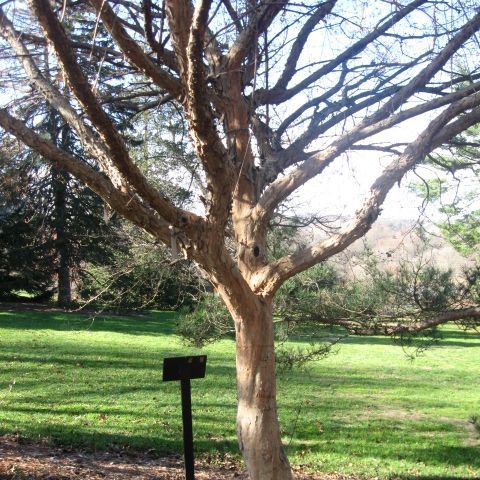
Dogwood (Japanese Cornel) "Lemon Zest"
Cornus Officionalis "Lemon Zes
Check out the “Lemon Zest,” an improved cultivar of Japanese Cornel Dogwood or Cornus Officionalis! This selection was done by the Morris Arboretum in Philadelphia, and we are pleased to include it in our inventory.
The yellow flowers appear in late winter to early spring. They are larger than the species with a light lemon scent. Imagine beautiful spring evenings in your garden with this aroma on the breeze!
The young bark of the Japanese Cornel Dogwood “Lemon Zest” is a beautiful, exfoliating copper color that gradually changes to the typical, mottled ash-grey-and-orange of the mature stems of the species.
Japanese Cornel Dogwood “Lemon Zest” tolerates a wide variety of soils including clay and compacted soil. You should place this tree in a prominent location where the flowers will catch the eye and the lemon scent can be enjoyed even in late winter as a promise of the coming growing season! This tree also makes a beautiful complement to dark-colored evergreens in the spring.
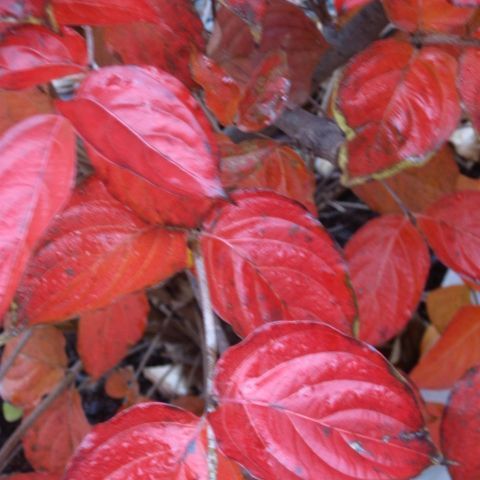
Dogwood (Kousa) "National"
Cornus Kousa "National"
Kousa Dogwood, or Cornus Kousa, is an elegant tree. It has an exquisite trunk and bark with a diverse pattern of gray, tan, and brown that gets more beautiful as the tree ages. The flowers are lovely in burgundy, red, and orange fall colors. Sometimes you get all three on the same plant! The cultivar “National” has larger flowers, a vase-shaped habit, and dark red fall color.
The Kousa Dogwood is much more amenable to culture than our native flowering dogwood. It tolerates adverse conditions better and is resistant to many of the pests and diseases that plague Cornus Florida, including Dogwood Anthracnose. Mature height is 25 to 30 feet with a spread of 15 to 30 feet. The Kousa tolerates shade quite well but will flower less conspicuously there than in full sun.
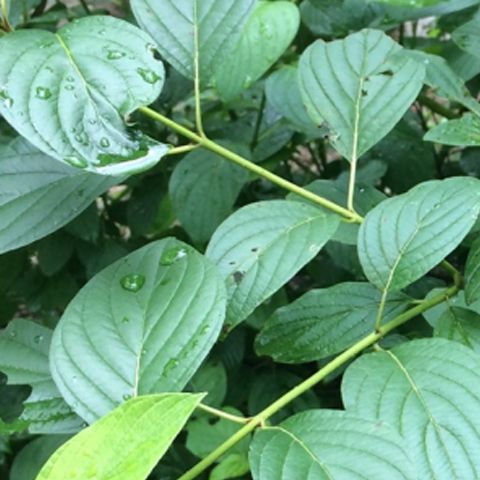
Dogwood (Yellow Twig)
Cornus Sericea "Flaviramea"
Yellow Twig Dogwood, or Cornus Sericea “Flaviramea,” is a shrub Dogwood with rich summer foliage and excellent fall color. If cut to the ground every spring, the one-year-old stems maintain an eye-catching yellow-green in the wintertime. The showy white panicles of the late-spring flowers turn into an even showier summer fruit. The flowers attract butterflies, and the berry drupe fruit attracts birds. Yellow Twig Dogwood has a stout constitution and will grow in very inhospitable conditions. The habit is loose and rounded with horizontal branches at the base of the trunk.
If unpruned, Yellow Twig Dogwood will grow 6 feet or 8 feet high and wide. An alternative is to maintain it as a small shrub of about 4 feet by coppice pruning. Coppice pruning involves cutting a woody plant to ground level every one to two years. While this eliminates the flower and fruit attributes, the stems will provide a fantastic show in the drab winter landscape, as noted above. The new growth will also appear more rapidly in the spring, giving you a plant with four-season appeal.
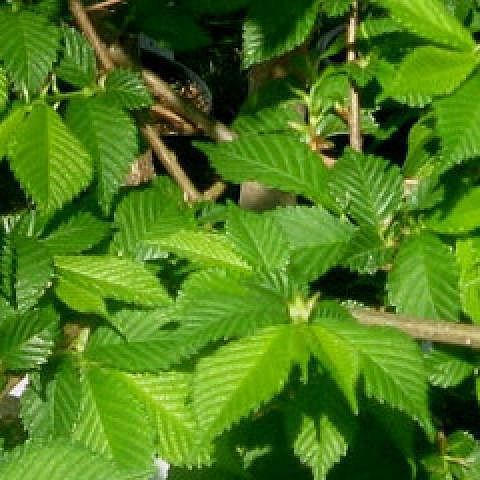
Elm (Triumph)
Ulmas X "Morton Glossy"
Most fast-growing trees are fraught with problems, but the Triumph Elm, or Ulmus Morton “Glossy,” is a notable exception. Place this tree in a difficult location where a lesser tree would curl up its root tips and die. Be prepared to watch it triumph! In addition to tolerating dry and compacted soils, this tree is resistant to Dutch Elm Disease, Elm Leaf Beetle, Elm Yellows, Phloem Necrosis, and many other problems that plague most elms. The habit is reminiscent of our native American Elm but with a finer texture.
As always, plant responsibly. The Triumph Elm can become quite large. Be certain the site is suitable for the tree.
This tree has the foliar appearance of Ash trees and makes an excellent replacement for Emerald Ash Borer victims.
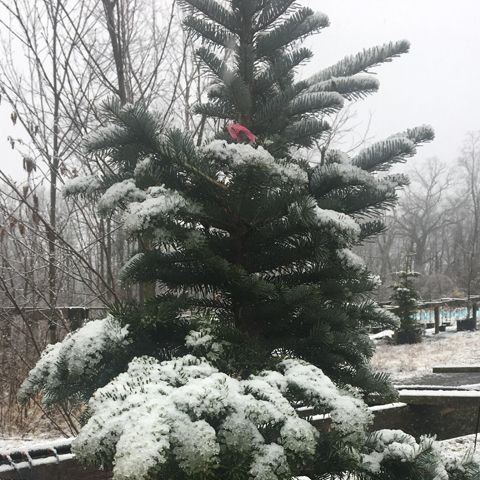
Fir
Abies
At Woodlawn LLC, we’ve always admired this genus. All Firs have an erect, noble habit that's both formal and easygoing. It has a dignified outline, but it still somehow blends admirably into a more relaxed landscape. The more we learn, the more enthusiastic we become about the possibilities of the genus Fir!
Firs are inclined to a more northerly distribution, and most native Firs do not do well in southern Pennsylvania. There are, however, some Asian Firs that are proving their mettle in the mid-Atlantic region. Take a look at our specific Fir options. We’re sure you'll find some options to get excited about!
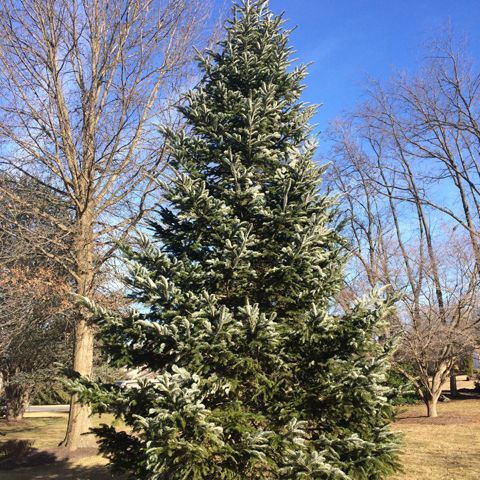
Fir (Nordmann)
Abies Nordmanniana
Tempering our enthusiasm for the Nordmann Fir, or Abies Nordmanniana, is difficult! Majestic in character, the outline is striking and bold without being obnoxious. The rich foliage of the needles shows a lush, dark green on top with a silvery underside, giving the tree a pleasing two-tone appearance. The branching usually descends all the way to the ground. Best of all, the Nordmann Fir, or Caucasian Fir, is one of the most trouble-free Firs in the Appalachian region.
It was discovered growing in the Caucasus Mountains of Eurasia in 1836 or 1837 by a Finnish naturalist named Alexander von Nordmann, for whom it is named. This is a large tree, maturing to a height of 70 feet or more. It grows slowly when very young but moderately fast after the first few years. In its youth, Nordmann Fir is attractive. As it comes of age, it becomes bold and impressive, a tree to be respected. It’s not afraid of summer. Nordmann Fir, along with the similar Turkish Fir, can be planted with confidence in environments where most Firs would languish. The obvious use for such a grand tree is as a specimen tree in a prominent location. If planted with other trees, be sure it is flanked by deciduous trees. If possible, situate it against the eastern or western horizons where the sunrises or sunsets can accent its bold outline.
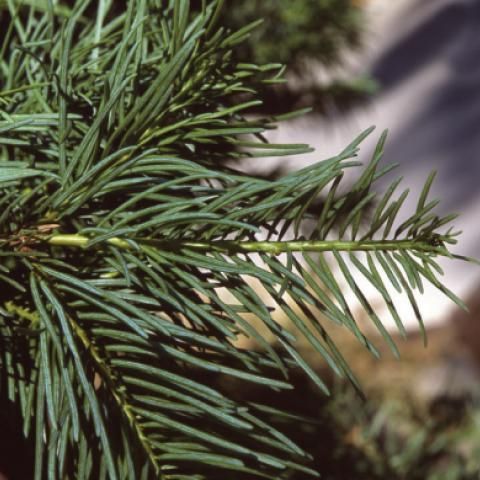
Fir (White)
Abies Concolor
| Container Size | Stem Caliper | Plant Height |
|---|---|---|
| #20 | 4-5' | |
| #43 | 3-3.5" | 8-10' |
Although native to the western United States, White Fir, or Abies Concolor, has also performed well in the east. The needles are 1.5 to 2.5 inches long, and the color varies from plant to plant. The color can range from light blue to medium green. The tree will reach 70 feet high and 25 feet wide. White Fir exhibits the distinctive Fir trait of the cones appearing upright on the branches, but an interesting note on the White Fir is that it might not produce cones or seeds for the first 40 years! White Fir is a hardy tree, tolerating dry and compacted soil. The habit is spire-shaped and narrow with tiered branches.
The popular Colorado Spruce (also known as Blue Spruce) has a similar outline and foliage color to the White Fir. Since we are seeing increased Cytospera infestations on the Colorado Spruce, we are recommending the White Fir as a superior substitute. Use as a specimen, in groupings, or for screening.
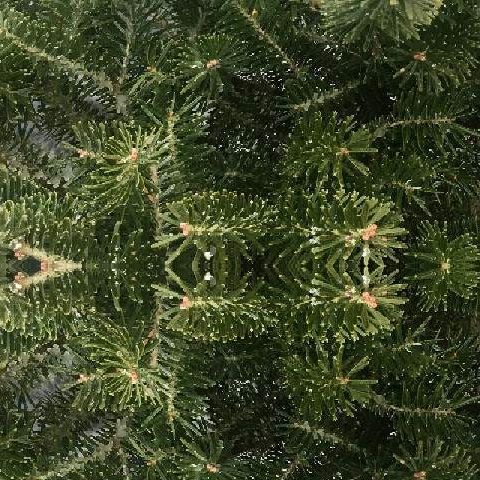
Fir (Manchurian)
Abies Holophylla
The Manchurian Fir, or Abies Holophylla, exhibits the elegant, rich green foliage of many others in the genus Fir. However, the Manchurian Fir is narrow and conical with a more open and informal habit than most other Firs. It is a noble tree that makes an excellent stand-alone specimen, reaching 30 to 50 feet in height with a spread of 20 to 30 feet.
Because of its partial-shade tolerance, Manchurian Fir can also be used as an understory evergreen in a grove or grouping. It prefers moist, although not water-logged, soil and does tolerate even heavy clay soil. Manchurian Fir has no serious insect or disease problems.
Plant a Manchurian Fir today and enjoy the noble beauty of the genus Fir!
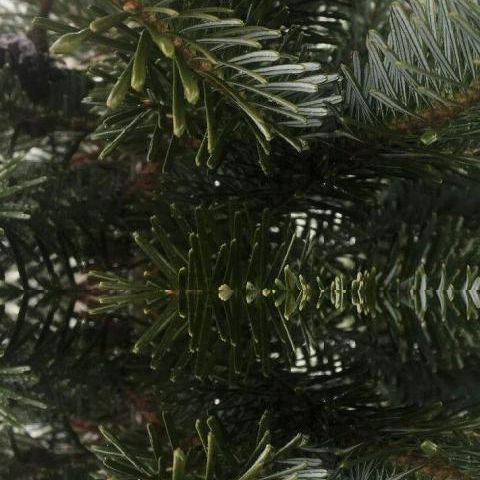
Fir (Silver)
Abies Koreana
Are you looking for a refined yet elegant evergreen? Check the Silver Fir. This tree has dark green needles with silvery undersides, contrasting handsome blue cones, and a classic form. The average height is 30 to 50 feet and a spread of 6 to 12 feet. Silver Fir tends to be more tolerant of hot weather and alkaline soil. Plant in partial shade for best performance.
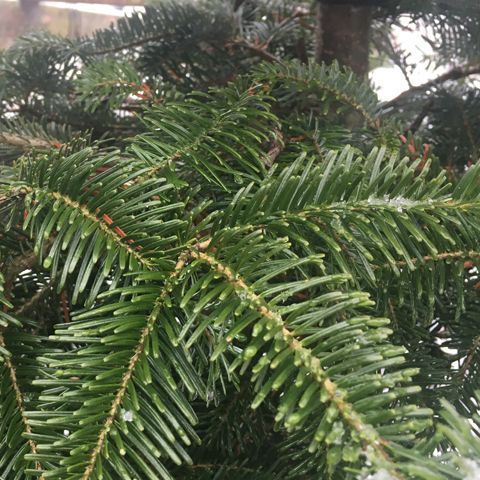
Fir (Turkish)
Abies X Bornmuelleriana
Turkish Fir, or Abies Bornmuelleriana, is a natural hybrid of Nordmann Fir and Greek Fir. It has a noble form and outline as so many Firs do. The upper side of the fragrant needles is a medium green, but the needles curve upward, exposing the silvery undersides for added beauty. The seed cones are purplish-brown and 4 to 6 inches long. Turkish Fir is a fast-growing tree, reaching a height of 50 to 80 feet with a spread of 10 to 15 feet.
A native of northwestern Asia Minor south of the Black Sea, Turkish Fir tolerates a wider range of temperature (meaning more summer heat) than most Firs. Also, this tree can handle less-than-ideal soil conditions, especially wetter soils. Mix Turkish Fir with deciduous trees to accent the fall color.
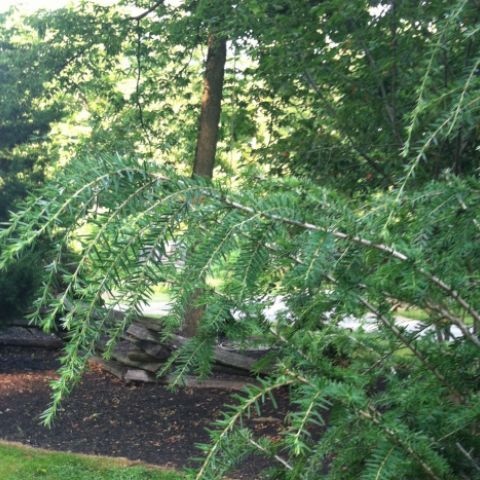
Hemlock (Chinese)
Tsuga Chinensis
Hemlocks are lovely trees, but the use of native species has been hindered by three debilitating pests: Hemlock Wooly Adelgid, Spruce Spider Mites, and Elongate Hemlock Scale. Chinese Hemlock, or Tsuga Chinensis, has shown resistance to all three pests, especially Hemlock Wooly Adelgid. Compared to Canadian Hemlock, the habit is more relaxed during the growing season and more rigid during the dormant season. The leaf color is a glossy, dark green. The growth rate is fast. Chinese Hemlock tolerates varying landscape conditions and grows well in either full sun or part shade. A native of the mountains of Southeast Asia, Chinese Hemlock has become a good, all-around, vigorous performer in North America.
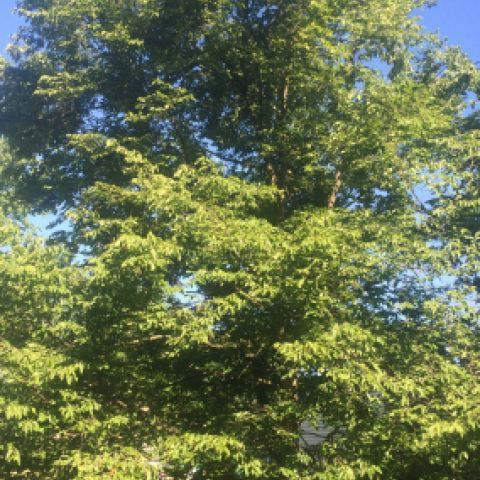
Hophornbeam (American)
Ostrya Virginiana
American Hophornbeam, or Ostrya Virginiana, is a small-sized to medium-sized native shade tree with flaking bark that blends perfectly with the medium-green foliage. The fall color is yellow. The bark and structure make a nice addition to the winter landscape.
Although a tough tree that will tolerate clay soil and drought well, American Hophornbeam may become tired and untidy-looking in late summer if growing conditions are difficult. This tree will blend nicely with most plants, and while not sensational in any season, it is always comfortably pleasing.
Hophornbeam grows to about 25 to 40 feet with a spread of 20 to 30 feet and can be used either as a specimen tree on the front lawn or as an accent plant at the corner of your house. It also makes a great understory tree in a naturalized situation. American Hophornbeam is also sometimes referred to as Ironwood due to its extremely hard, dense wood.
Hophornbeam is often used as a substitute for American Hornbeam, as Hophornbeam tolerates drought conditions better. Hophornbeam, however, does not tolerate wet soils. The habit of the Hophornbeam is more open than the American Hornbeam and is superior in summer. American Hornbeam's fall color, however, is more impressive.
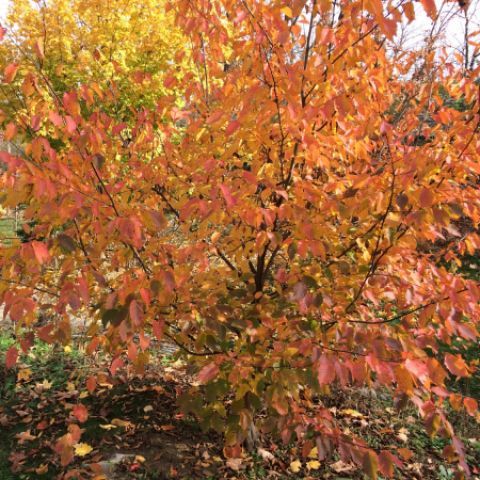
Hornbeam (American)
Carpinus Caroliniana
This tree has rich summer foliage with a dash of reddish new growth. Fall colors of yellow, orange, red, and burgundy. You’ll love the finely textured structure with a fluted trunk (which sometimes leads to its nickname of Musclewood) to add to the winter interest. All this describes the American Hornbeam, or Carpinus Caroliniana, a widespread understory tree growing 25 to 40 feet high. The American Hornbeam is native to the eastern United States deciduous forest. Small, dapper, and handsome, tolerating both full sun and part shade, this tree is also quite tolerant of compacted and clay soils. American Hornbeam also makes an excellent urban tree.
The American Hornbeam is a versatile tree that can be used as a specimen in the front lawn, as a corner accent plant, or as an understory tree in the backyard. American Hornbeam is resistant to Juglone and can be planted beneath Black Walnut. The leaves are marcescent, holding a warm tan into early winter.
The extremely hard wood of the American Hornbeam was once used by early Americans to make bowls, tool handles, and ox yokes. As the name suggests, the wood would take a horn-like polish.
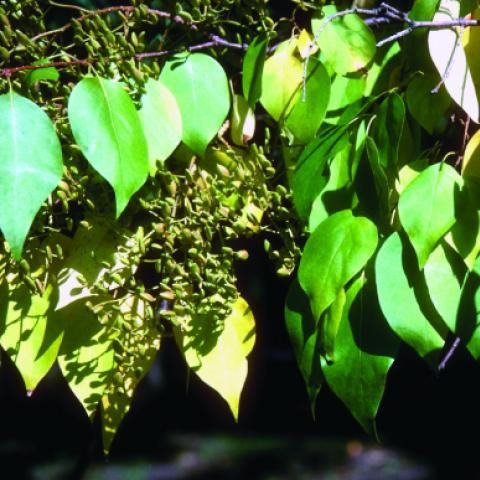
Lilac (Peking) "Beijing Gold"
Syringa Pekinensis "Beijing Gold"
The “Beijing Gold” Lilac, or Syringa Pekinensis, is a tree Lilac with good form and excellent late-spring flowers. Although the bark is not as showy as the "China Snow," the outline is superior with a straighter stem and more balanced growth habit. The fall color is a beautiful yellow with a touch of orange. Tolerant of difficult growing conditions, this tree Lilac grows up to 20 feet high and 15 feet wide with a slightly smaller spread. Although native to wooded areas on slopes, valleys, and ravines in northern China, Peking Lilac trees do very well in North America.
You can use it as a street tree, a specimen plant, or a corner accent. Peking "Beijing Gold" Lilac is a very versatile tree.
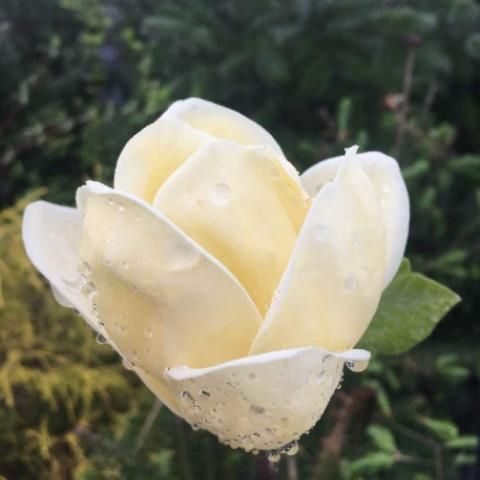
Lois Magnolia
Magnolia X "Lois"
Lois Magnolia is a small tree or large shrub that produces stunning yellow blossoms in the spring before the leaves come out. The tree blooms for several weeks and appears to be dripping yellow beauty during its peak. The foliage is a rich dark green during the summer. The fall color is a gorgeous copper bronze. Lois Magnolia thrives in full sun to partial shade and moist, well-drained, acidic soil. Since it does not tolerate urban pollution, its usage as a street tree is limited. Lois Magnolia reaches heights of 30 to 40 feet and makes an excellent accent plant for gardens and landscapes with its distinctive pyramidal outline. The somewhat coarse texture of its foliage sets it apart from other trees with a finer foliage texture, making it an attractive companion plant.
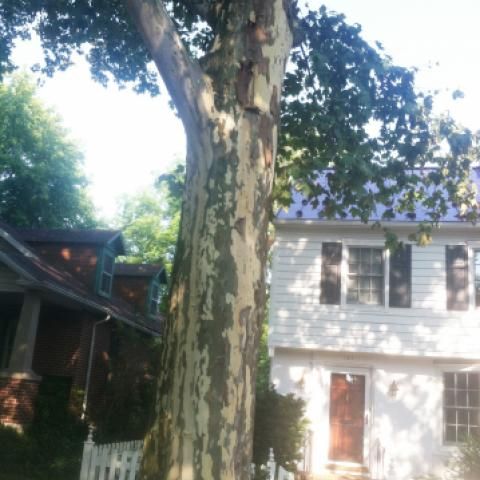
London Planetree
Platanus X Acerifolia
London Planetree (Plantanus x Acerifolia) is the result of crossing the American Sycamore and the Oriental Planetree several centuries ago. Widely planted as an urban tree in London because it was among the few varieties that could withstand London’s sooty environment in the 1800s, it soon spread to many other cities in Europe and America. In fact, London Planetree has been planted more widely in cities around the globe than any other tree! London Planetree is a beautiful shade tree growing 75 to 100 feet high. Its most outstanding feature is probably the patchy exfoliation of the brown outer bark, which reveals the creamy-white inner bark. This is a beautiful addition to the winter landscape. The dark green leaves of summer turn an unremarkable yellow-brown in the fall.
The London Planetree prefers rich, moist, well-drained soils but can survive in almost every other soil condition as well. Very tolerant of high pH conditions and pollutants as was mentioned, this specimen tree should be planted in full sun or very light shade in large parks and yards. The “Exclamation” cultivar boasts a more uniform pyramidal growth habit and is much more resistant to prevalent diseases such as Anthracnose, Powdery Mildew, and Frost Cracking. It is a product of the Morton Arboretum.
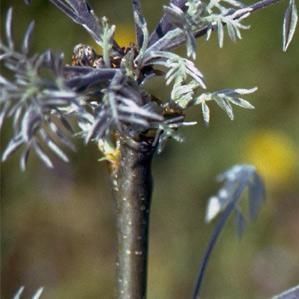
Maacki (Amur)
Maacki Amurense
Amur Maacki, or Maacki Amurense, is a handsome tree, though little known and used. The foliage emerges a unique, blue-green color and matures to a rich, dark green. The leaves are each composed of five to seven leaflets that are 1.5 to 3.5 inches long. The spike-like clusters of white flowers blossom during midsummer when few other trees are blooming. Even the scaly bark is quite handsome, peeling into curls and flakes as the tree ages. The fall color is yellow-green. A tough tree, Amur Maaki takes compacted and dry soils in stride. Infertile soils are not a problem either, as this tree fixes atmospheric nitrogen. It matures at about 25 to 40 feet high and 20 to 30 feet wide.
Amur Maacki can be used as a small shade tree, a patio tree, a street tree, or for other specimen use. We would avoid placing it in groupings. Although an ornamental tree when used alone, blending it with other trees of the same size will result in its being lost in the crowd.
The Amur Maacki tree honors both its discoverer and its original habitat. Karlovich Maack, a 19th-century Siberian explorer, discovered this tree growing in the region of the Amur River, the border between China and Siberia. It was introduced into cultivation in 1864.
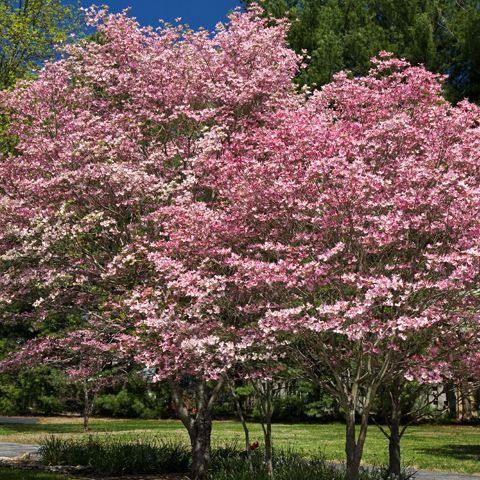
Magnolia (Blushing Belle)
Magnolia X "Blushing Belle"
What a stunner! Magnolia Blushing Bell has perfumed April flowers that are shaded in lush pink tones. This pink precedes bright green new growth. Sheltered locations are best to protect the flowers and buds from cold and wind. The height can reach 20 feet, the width can span 20 feet. These are best grown in consistently moist, slightly acidic, well-drained soils.
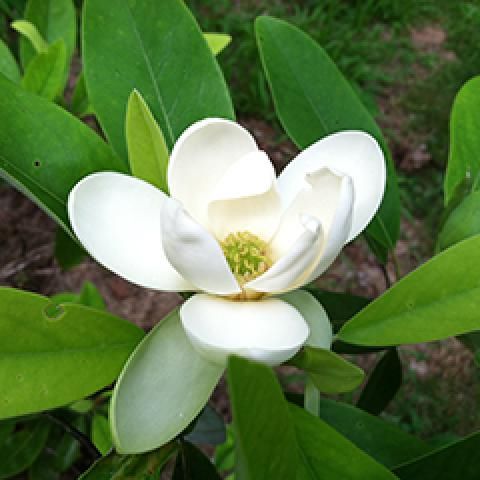
Magnolia (Sweetbay) "Moonglow"
Magnolia Virginiana "Moonglow"
The lemon scent of the Sweetbay, or Magnolia Virginiana, blossoms on an early summer evening is like nothing else. The 2-inch to 3-inch, cream-colored flowers, while very attractive individually, would be visually overwhelming if they appeared in too large of numbers. Fortunately, they don't grow this way. Instead, the blooms appear a few at a time over a period of four to six weeks, giving us a lovely aroma that begins about the first of June and lasts well into July. As summer breezes stir the leaves, they expose the silvery undersides, adding to the soft, ornamental beauty of the plant. The red fruit appears in late summer. Sweetbay is very attractive even in winter!
Sweetbays are native to marshy areas of Appalachia and tolerate wet feet better than most Magnolias. Pest-resistant and disease-resistant, they are available in clump or single-stem plants and grow 10 to 35 feet tall. The leaves are deciduous in northern parts of the country but evergreen in the deep South.
Sweetbay can be used as a specimen, a corner accent, or an understory plant, but possibly the best use is to place it in the foreground of brick or stone masonry. Sweetbay also makes an almost perfect contrast plant for both broadleaf deciduous trees and evergreen conifers.
The genus name, Magnolia, honors Pierre Magnol, a French botanist who lived from 1638 to 1715, while the species - Virginiana - means “of Virginia.”
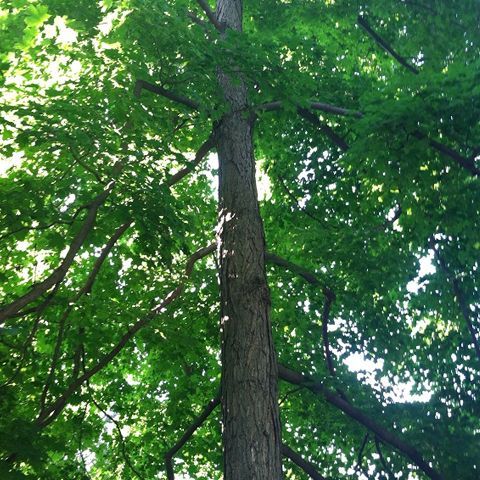
Maple
Acer
This is one of the most variable genera. Maples range from ornamental shrubs and small trees to large forest giants. Foliage also varies from light green to almost black. While we usually think of the leaf shape of the Sugar Maple or Red Maple as typical, the leaves, too, come in many shapes and sizes. Flowers can be green, orange, red, or yellow, and bark colors are extremely variable, including various hues of grey, brown, black, green, white, and even red.
Maples also have diverse cultural requirements. Some, such as Japanese Maple, can be somewhat demanding, insisting on moist, well-drained soil and other particular conditions. Others are tough, resilient individuals that take less-than-ideal soils in stride. Maples represent the best and worst of trees.Some are gentle, handsome, and seductive while others are obnoxious brutes. We obviously don’t carry the brutes at Woodlawn LLC!
When referring to Maples, one of the first characteristics we would name would be fall color, and for good reason. Acer takes more fall color awards than any other tree genus.
One word of caution is in order, however. Maples have been planted extensively in the landscape to the point of overuse, partly because of their versatility. Looking for pleasant shade? Here's the perfect Maple. Want an exciting ornamental or conversation specimen? Maple has you covered. This has resulted in Maple becoming the tree that can do no wrong. Unfortunately, too many trees of one genus create a monoculture, and monocultures cause problems. Variety is the key to sustainable landscapes. Your trees should consist of no more than 20% of any one genus and no more than 10% of any one species. If you live in a close neighborhood with too much Acer already, it's best to enjoy your neighbor's Maple trees and plant something else on your own property. There really are many other worthy landscape trees. Give us a call, and we'll be happy to visit your landscape and give suggestions.
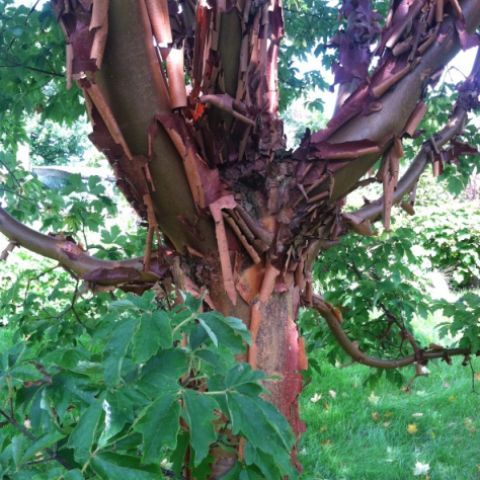
Maple (Paperbark)
Acer Griseum
The Paperbark Maple, or Acer Griseum, has many positive traits. The attractive foliage is a medium-green to blue-green, and the burgundy-red, exfoliating bark provides a level of winter interest that is almost unmatched. Tolerant of poor soils and urban conditions, it grows slowly to reach approximately 30 feet in height. Paperbark Maple has no significant disease or insect problems. Since it is not readily available commercially, it is, however, seldom planted. This is a loss to all of us.
E. H. Wilson imported this tree into England from China in 1899. The Arnold Arboretum introduced it into the United States shortly thereafter.
Acer Griseum is hardier and more amenable to those tough urban conditions than the commonly used Japanese Maples. You can also use it as a specimen, a corner accent, in groupings, or in front of a light-colored hardscape such as a stone wall. The Paperbark Maple's bark is especially eye-catching after a fresh snowfall, so situate it where it can be appreciated in the winter landscape.
At Woodlawn LLC, we have an excellent selection of Paperback Maple. Stop by to get yours today!
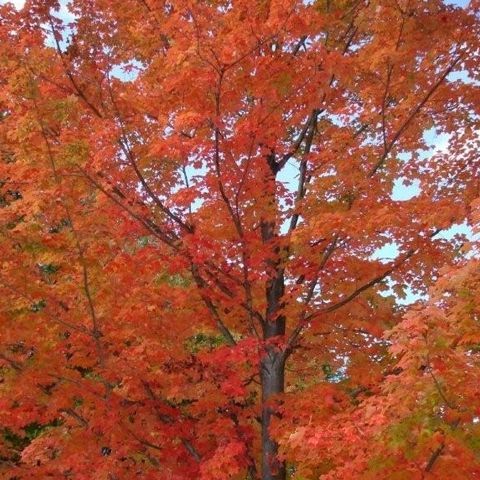
Maple (Red) "Sun Valley"
Acer Rubrum "Sun Valley"
Although the Red Maple trees, or Acer Rubrum, have red spring flowers, wonderful shade, and exceptional fall color, they are, as a species, an ornamental inferiority to the flaming Sugar Maple. The Red Maple does hold one trump card over the Sugar Maple, however. It tolerates urban conditions much better. Is there any way to have the best of both of these worlds? There is! The Red Maple cultivar “Sun Valley” has been selected for superior ornamental traits almost matching those of the Sugar Maple, while retaining the amenability to urban culture of the Red Maple. “Sun Valley” maple is a very desirable tree.
With its smaller leaves and lovely orange-red fall color, the spring flowers and fall color of “Sun Valley” are enhanced by blending it with evergreens. Pruning to develop structure is very important as this tree is prone to developing co-dominant stems. “Sun Valley” Maple grows 50 to 60 feet high and 30 to 40 feet wide and is tolerant of both wet and dry soils.
Please accept one word of caution. Red Maple trees are widely planted, sometimes to the point of creating monocultures. Choose another tree if you or your neighbors have 10% or more of this species. Since they are native to eastern North America from Quebec to Minnesota and south to Florida and eastern Texas, they are ubiquitous throughout much of North America.
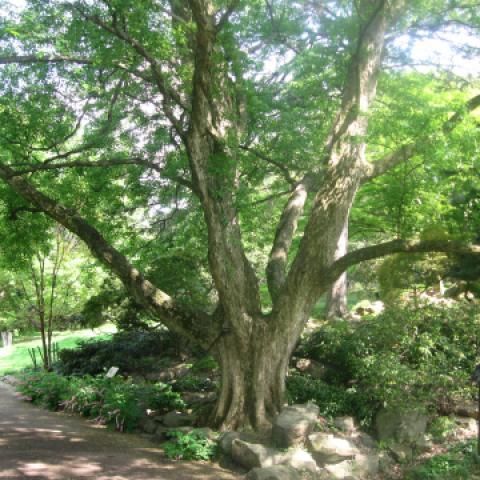
Maple (Trident)
Acer Buergerianum
Native to China, Korea, and Japan, Trident Maple, or Acer Buergerianum, is a handsome, small-sized to medium-sized Maple reaching 20 to 30 feet tall with an equal spread. It exhibits glossy, dark-green foliage and pleasant shade with an attractive, oval-to-round branching structure and exfoliating bark. On old trunks, this gray, orange, and brown exfoliation is especially attractive.
A versatile tree, Trident Maple is tolerant of difficult growing sites and urban situations and, unlike many Maples, is resistant to leaf scorch even under drought stress. It makes an excellent choice for small residential lots and sites beneath utility wires. The fall color is red and orange with good leaf fall.
The name Trident comes from its three-lobed (or tri-lobed) leaves.
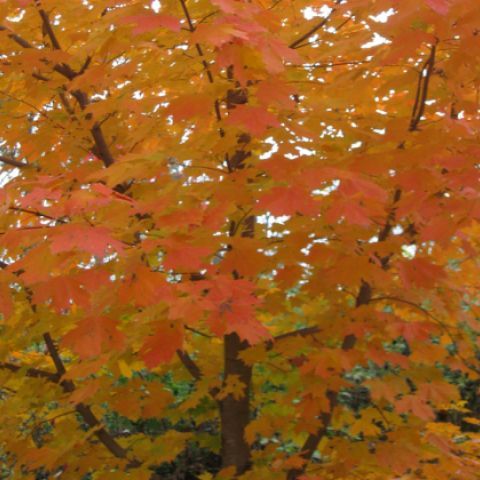
Maple (Rock, Sugar, Hard)
Acer Saccharum
A main component of the eastern hardwood forest in the United States, Sugar Maple, or Acer saccharum, is one of the trees most responsible for giving New England its reputation for spectacular fall color, and if the situational requirements can be met, it is one of the best large shade trees available. Soft, light-green flowers in the spring and rich, dark-green foliage in the summer, when combined with the grey, furrowed bark and winter structure, would be more than enough to place this tree high on any list of landscape trees. However, Sugar Maple unites all this with its unrivaled fall color of brilliant reds, oranges, and yellows. Sometimes you see all three on the same tree! Few other trees come close to it in the autumn season. Sugar Maple does need moist, well-drained soil and a pollution-free environment, however.
Acer Saccharum, growing 40 to 80 feet tall with a slightly smaller spread, will add to any location where it has the room to grow and contributes much to lawns, parks, golf courses, and campuses. It can serve as a specimen, be grouped with evergreens to enhance its autumn foliage effect (as if it needed enhancing), or stand outlined against the sunrise or sunset in the dormant season. The possibilities are endless.
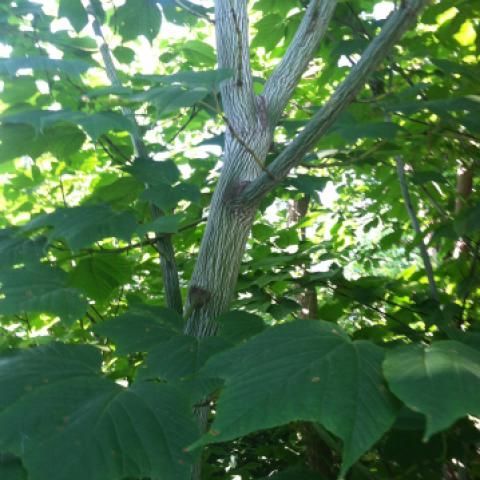
Maple (Snakebark)
Acer Pennsylvanicum
Snakebark Maple, or Acer Pennsylvanicum, is an understory native that is rarely used in the landscape. A somewhat picky performer, it does best in moist, acidic, well-drained soils with light shade as the leaves may scorch in full sun. If the proper conditions are present, Snakebark Maple makes a pleasing sensation in the landscape. The leaves are a rich medium-green, turning a butter-yellow in the fall. Possibly no tree has bark as variable as Snakebark Maple. During late winter and early spring, the bark exhibits a medium-green with white striations. As the season progresses into early summer, the white becomes more dominant as the stems gradually change to a more modest green background with black striations in the fall. This tree is especially useful in a naturalized landscape as an understory tree, where it usually grows 15 to 25 feet tall with a slightly smaller spread. For the best effect, place it in front of a dark background to accent the bark or among trees with a red fall color to add to the autumn palette.
There are several other names for the Snakebark Maple, each reflecting an interesting point about the tree itself. The leaves somewhat resemble a goose foot, hence the name of Goosefoot Maple for this plant. Since moose and white-tailed deer often browse the leaves and young twigs, some people have given it the name of Moosewood. Finally, since whistles can easily be carved from branch sections, some have dubbed it Whistlewood. Whatever you choose to call it, Acer Pennsylvanicum (the scientific name refers to its being native to the state of Pennsylvania) should be considered as a possible addition to your landscape!
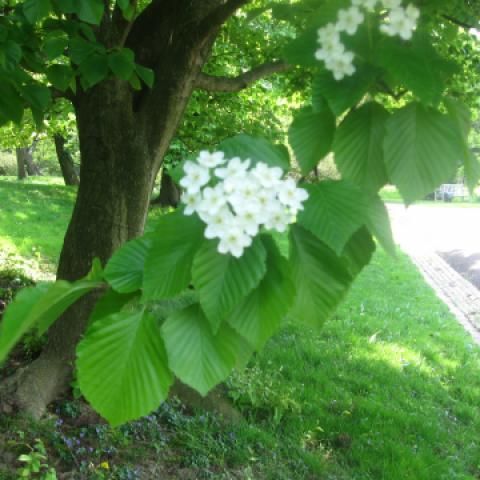
Mountain Ash (Korean)
Sorbus Alnifolia
Mountain Ash are beautiful trees, but most do not perform well in the landscape due to their susceptibility to Borer and Canker problems. Korean Mountain Ash, or Sorbus Alnifolia, however, is more pest-resistant than most other members of its genus. Korean Mountain Ash is not a true Ash tree (Mountain Ashes are actually in the rose family) and is therefore not susceptible to Emerald Ash Borer. Plant this tree for the flower effect in late spring, the rich summer foliage, and the smooth, green-grey bark. Its fall color is orange, yellow, and golden brown with fruit accompanying the fall foliage.
Ornamental effects can be enhanced by planting it against an evergreen background. Korean Mountain Ash needs moist, well-drained soil and full sun for the best performance. It grows 40 to 50 feet high and 30 feet wide with a habit that is pyramided to rounded.
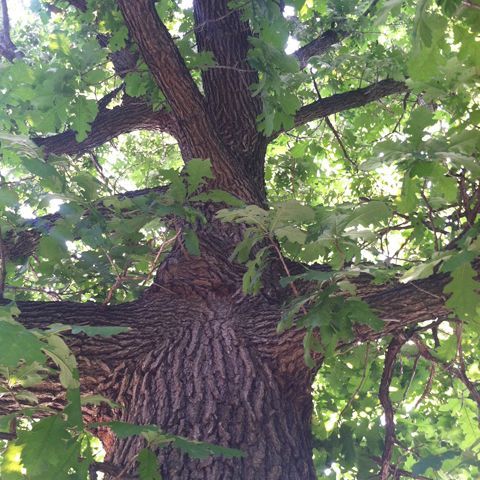
Oak
Quercus
The Oak tree is one of the most loved tree genera in the world because of its beauty and because of its status as a symbol of strength and durability. There are up to 800 species of Oak in the world.
There are two groups of Oak trees: the Red Oak group and the White Oak group. Chestnut Oaks then compose a subgroup under White Oak.
Trees in the Red Oak group have pointed lobes and dark, almost black-colored, bark. White Oaks also have rounded lobes with ash-grey bark on most species.
Oaks tend to have a majestic and rugged habit. Fall color varies from brilliant red and scarlet to muted yellow and brown.
The Red Oak group:
- Scarlet Oak
- Shumard Oak
- Red Oak
- Black Oak
- Nuttall Oak
The White Oak group:
- Swamp White Oak
- Burr Oak
- White Oak
The Chestnut Oak group
- Swamp Chestnut Oak
- Rock Chestnut Oak
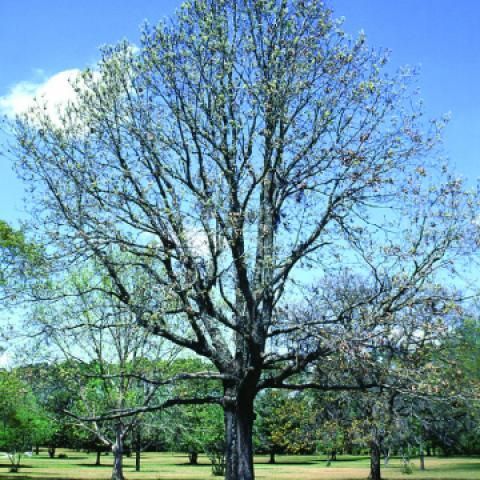
Oak (Black)
Quercus Velutina
A common tree in the Appalachian forests, Black Oak, or Quercus Velutina, is rarely found in nurseries and, unfortunately, is seldom planted. With its rich, glossy foliage, it is possibly the best shade tree in the Red Oak group. The bold, dark structure of the tree in the dormant season makes it a valuable addition to the winter landscape, especially after a snowfall. The bark is also interesting, featuring black with a blocky pattern. Its acorns are a food source for many birds and other wildlife. In fact, although it is a wonderful yard and park tree, its prolific acorn production sometimes precludes its use as a street tree due to the extensive cleanup required.
Black Oak is more tolerant than Red Oak to urban growing conditions and is also resistant to Oak Wilt and Bacterial Leaf Scorch. It will tolerate a variety of poor soils in the wild with dry, sandy, and heavy clay among them. It grows 60 to 80 feet high and 30 to 40 feet wide. Black Oak is primarily native to slopes, ridges, and upland hills from Florida to Texas. It can also be found north to Maine and west to Michigan and Minnesota.
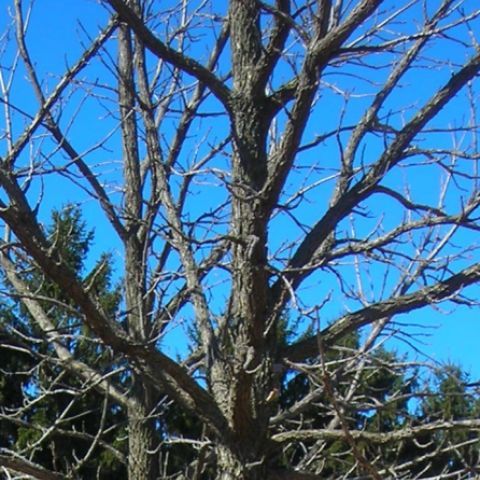
Oak (Burr)
Quercus Macrocarpa
Burr Oak, or Quercus Macrocarpa, one of the most majestic of our native oaks, is an adaptable tree with a rugged, cork-like bark texture that is especially noticeable when the tree is young. Summer foliage is a rich green, and fall color is a warm brown. The leaves are especially large. They can be 10 to 12 inches long! The winter outline is bold and open.
Burr Oak is a superb specimen tree, very tough and tolerant of both acidic and alkaline soils. It also handles either poorly drained or dry soils with relative ease and makes a fine urban tree if given enough space. Speaking of space, give it plenty. Quercus Macrocarpa can grow for centuries, reaching a height of 60 to 80 feet with a spread of equal size. This is one of those legacy trees. We plant them with the knowledge that our children and grandchildren will receive more benefits from them than we will.
That's perfectly okay. Tree planting is all about giving, not getting!
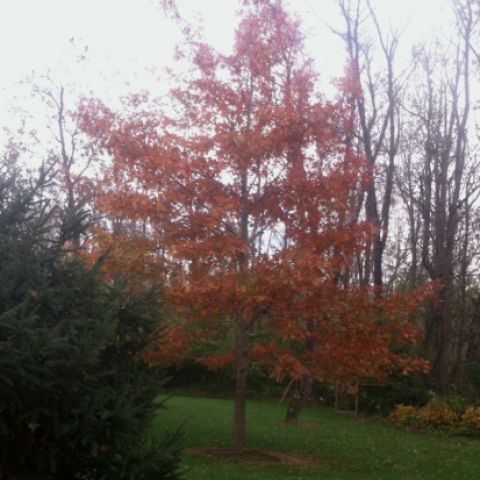
Oak (Nuttall)
Quercus Nuttallii
Nuttall Oak, or Quercus Nuttallii, a Pin Oak look-alike without the chlorosis problems, takes high pH soils in stride. In the spring, the new growth emerges reddish purple, changing to medium-green foliage during summer, and finally finishing out the season with excellent, orange-red fall color with a complete leaf drop as a bonus. The species is known for developing a full pyramidal canopy at an early age and rounding out as it grows older.
Nuttall Oak develops a good structure with a dominant central leader and usually reaches 50 to 80 feet tall with a slightly smaller spread. Oaks are often associated with slow growth, but not this one. Plan on at least 2 feet of growth per year and give your Quercus Nuttallii plenty of room. Nuttall Oak is tolerant of hot temperatures and urban conditions and makes an excellent shade tree. It can also be confidently planted as a specimen or street tree in parks, golf courses, and on campuses.
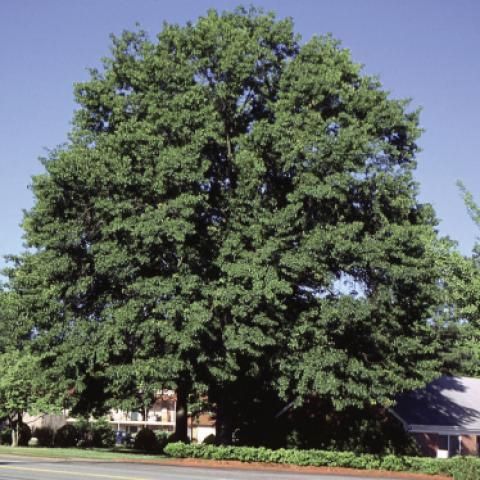
Oak (Red)
Quercus Rubra
Of all the Oaks, Red Oak, or Quercus Rubra, is the most distinguished for its bold, clean trunk and branches. The smooth bark, striated in long vertical sections, highlights the contrast between the smooth, raised surface and the darker-colored bark in between. This structure is especially handsome in the winter. Red Oak is a large tree, growing up to 70 feet or more with a spread of 50 to 70 feet.
The new growth in springtime is an interesting dusty, bronze-red hue that is almost as striking as the spring-flowering trees. In the fall, the Red Oak acorns are among the first acorns to ripen, making them an important early food source for wildlife. One interesting fact about Quercus Rubra is that it may not produce a full crop of acorns before reaching 40 years of age!
At Woodlawn LLC, we are becoming increasingly impressed with the performance and longevity of Red Oak. It doesn't like heavily compacted soil, but otherwise, it's a reliable urban performer. With its bold outline and clean trunk and branches, it makes an impressive silhouette against the sunrise or sunset.
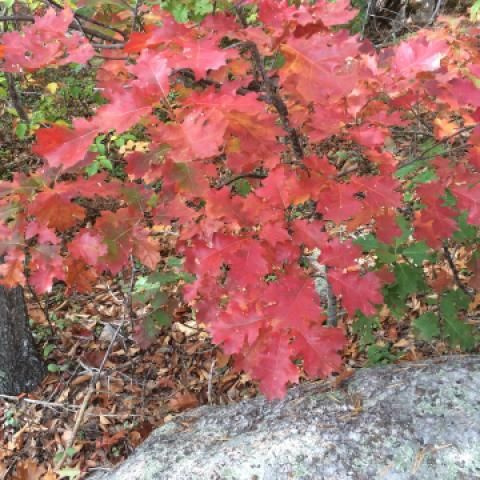
Oak (Scarlet)
Quercus Coccinea
High in the mountains on dry, rocky ridges in obviously inhospitable growing conditions, the Scarlet Oak, or Quercus Coccinea, flourishes. Because of its lower lumber value, foresters consider it a second-rate species. In the landscape, however, it is one of our best Oaks as it thrives in difficult soils and challenging urban and suburban environments. Often misidentified as Pin Oak, Quercus Coccinea is much more tolerant of alkaline soils.
The foliage of the Scarlet Oak is a rich, dark, almost reflective green during the growing season and an outstanding scarlet red in the fall. This flaming autumn beauty often lasts three to four weeks. Similar in size to the other large native Oaks, Scarlet Oak matures in the landscape at about 70 feet high and 30 to 40 feet wide.
If Quercus Alba is the standard by which we measure all trees in the White Oak group, Quercus Coccinea ought to be the standard by which all trees in the Black Oak group are measured. Several close contenders do exist, but the brilliance of Scarlet Oak's fall color puts it ahead of the rest. Plant it as a specimen shade tree and enjoy its glory for years to come!
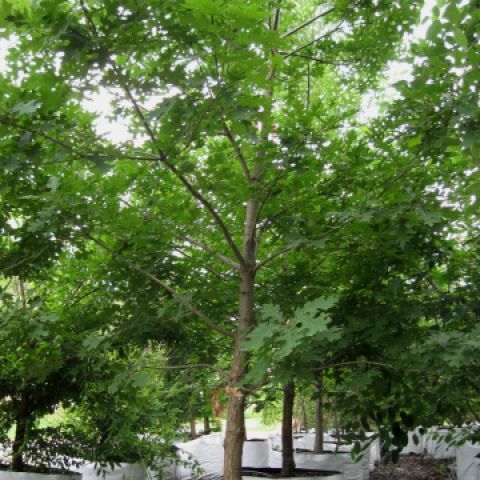
Oak (Shumard)
Quercus Shumardi
The Shumard Oak, or Quercus Shumardi, is an endangered species in the forests of Pennsylvania as only a few groves exist in Adams and Fulton counties. As an urban or suburban tree, Quercus Shumardi is much superior to the similar Pin Oak, as it tolerates high pH soils and adverse conditions much better. The Shumard Oak's fall color is also more reliable than the Pin Oak with orange, red, and burgundy appearing around the end of October. Size is comparable to most other large Oaks, reaching close to 70 feet with a slightly smaller spread. Pyramidal in youth, the canopy spreads to a broader, more open crown with age.
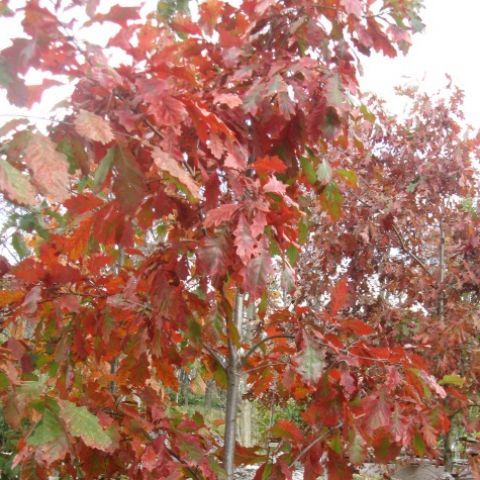
Oak (Swamp Chestnut)
Quercus Michauxii
The Chestnut Oaks are known for their tolerance of difficult locations, and the Quercus Michauxii is no exception, thriving especially in wet locations as its name suggests and tolerating even occasional flooding. This tree has the lightest-colored bark and the best fall color of all the Chestnut Oaks. Its leaves turn a deep, rich red, and this tree should find its place in more landscapes. An enormous tree, Swamp Chestnut Oak grows to about 70 or 100 feet high with a similar spread, and its growing range stretches from New Jersey to northern Florida, west to eastern Texas, and up the Mississippi River Valley to southern Illinois and Indiana.
The tree's species name comes from the French naturalist Francois Andre Michaux (1770-1855) who first described it. An interesting fact is that Swamp Chestnut acorns are often not produced until the tree reaches 20 to 25 years of age. These acorns were often consumed by livestock including cows, which led in years gone by to the common name of Cow Oak. Another common name, Basket Oak, was used because the wood was often split into thin but flexible strips for weaving heavy baskets used to harvest cotton from fields in the American South.
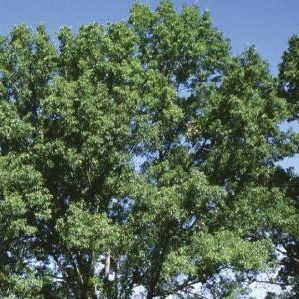
Oak (Swamp White)
Quercus Bicolor
If you want a bold, durable, and magnificent tree. Consider Swamp White Oak or Quercus Bicolor. This tree grows 50 to 60 feet tall with a spread of the same size, and it is a very similar tree to White Oak. They share the same aura of nobility with wide, spreading canopies of similar dimensions. Both are in the White Oak group.
There are a few differences. Swamp Oak bark is broken into smaller plates. Moreover, Swamp Oak tolerates compacted and wet soils better than White Oak, and it is easier to transplant than White Oak. Swamp Oak leaves are a darker green during the growing season. The leaves of the Swamp White Oak are shiny green on the top and silvery white on the bottom. That is the reason for the species name, Bicolor. Overall, Swamp Oak's fall color is inferior to White Oak's, but Swamp White Oak acorns are more likely to attract wildlife than White Oak's are.
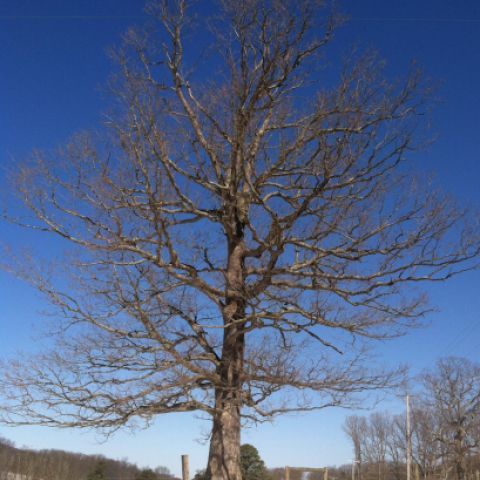
Oak (White)
Quercus Alba
This is a truly grand tree! Noble, majestic, and durable both in appearance and in actual performance, we find this tree inspirational in all seasons. White Oak, or Quercus Alba, is never gaudy or flashy but is always solidly attractive. The structure, foliage, and bark color (all of its attributes in fact) come together to cause one to reflect on the majesty of God's handiwork. It easily ranks as one of America's greatest native trees.
The leaves are round-lobed, typical of trees in the White Oak group. The leaves open in the spring with pinkish hues that change to a soft, light green and finally mature into a rich, medium-dark green. The fall color is usually russet-red or burgundy. Young trees sometimes retain their foliage into the winter, but older trees almost always have clean leaf drop in the fall. The bark is broken into small vertically-arranged blocks or longer, scaly strips. The bark color is a light ashy grey that blends beautifully with the foliage at all stages of development. After the growing season has ended, the bark continues its appeal during the dormant season, blending its colors and textures with the solid structure and curves of the branches against the winter sky. White Oak is truly a four-season performer.
White Oak is also a patient tree. It takes an investment of time for White Oak to become the stately and noble tree we have just described. Today’s buying public too often has a short-sighted demand for instant gratification, but a mature White Oak is well worth the wait.
White Oak, however, does not tolerate change well. A new patio or driveway, an excavation to fix a water line, or simply soil compaction from people or equipment can wreak havoc on the root systems of many of our landscape trees, and White Oak is especially sensitive to these things. A small construction project can be the beginning of the end for an otherwise healthy Quercus Alba tree.
As with any other endeavor, successful White Oak culture simply means working within the limitations. Success in placing this fantastic tree in your landscape can be accomplished with a few common-sense guidelines, as follows:
- Be sure you have a suitable soil environment. While not overly hard to please, White Oak will not tolerate extremely poor soil. Do not attempt to place this tree in poorly drained or severely compacted traffic areas as described above. If growing conditions are marginal, you may want to substitute a Burr Oak or Swamp Chestnut Oak instead.
- Be certain the area has enough room for White Oak to reach its mature size of 50 to 80 feet with an equal spread.
- Think ahead. White Oak should be planted where it can grow undisturbed for centuries. Place the tree in a location not likely to be disturbed by any future construction or excavation.
- Purchase trees that have been propagated and grown in root-pruning containers. Trees grown by conventional methods are off to a very slow start at best. Root-pruning containers are designed to create a fibrous root system, and if properly installed and cared for, a root-pruned tree will establish itself very quickly with little to no transplant shock.
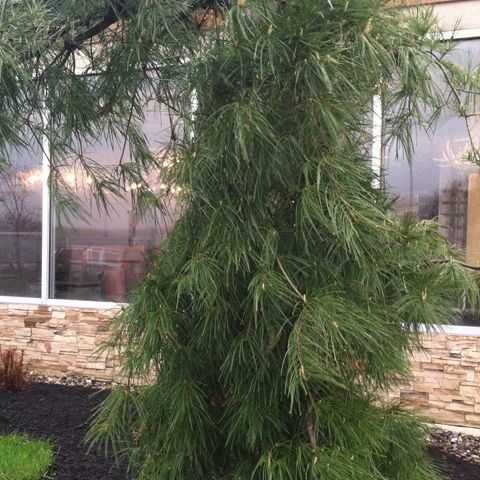
Pine
Pinus
Noble and soft are apt descriptions of the genus Pine. There are two sub-groups: the hard Pines and the soft Pines. Soft Pines, also known as White Pines, are characterized by soft, white wood and light, flexible needles that grow in bundles of five. Hard Pines have harder wood and stiffer needles that grow in bundles of two or three.
All Pines offered at Woodlawn LLC are soft Pines. These Pines are most suited to the cultural conditions in the mid-Atlantic region.
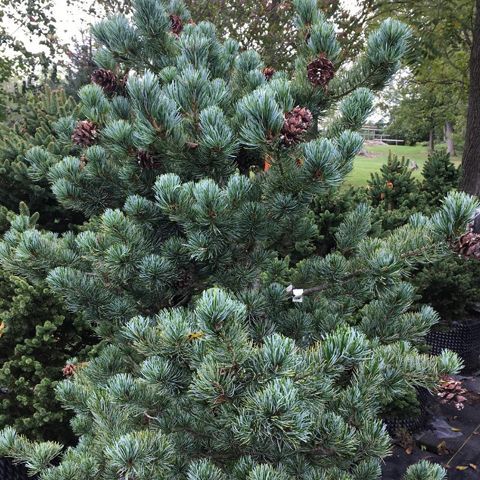
Pine (Japanese White) "Aoba Jo"
Pinus Parviflora "Aoba Jo"
“Aoba Jo” Pine, or Pinus Parviflora “Aoba Jo” has short, bright blue needles that curve, exposing the light-colored bottom sides and giving the appearance of a variegated, green-and-silver foliage. “Aoba Jo” also has a narrow, upright form that makes this slow-growing variety of Japanese White Pine a real winner. Layered secondary branches create attractive tiers of foliage resembling the ascending floors of a narrow building.
For the best results, locate this specimen plant in front of a solid background such as a stone wall or building to enhance the layered effect. “Aoba Jo” is a dwarf conifer growing up to 8 to 12 feet tall and can be used in those tight places. It will thrive best in full sun to light shade.
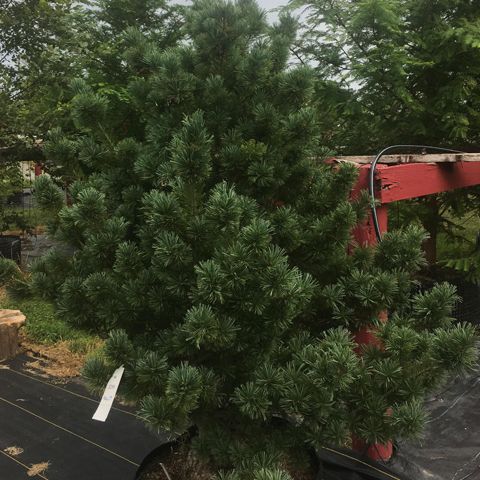
Pine (Japanese White) "Kokuho"
Pinus Parviflora "Kokuho"
Pinus Parviflora “Kokuho” is an irregular globose selection of Japanese White Pine with dense, uniform branching and soft, pale-green needles that grow with a slight twist and measure around 1 inch long. Foliar buds have a reddish cast that attractively accents the needles in winter and spring. After 10 years of growth, a mature specimen will measure 3 feet tall and wide with an annual growth rate of 2 to 3 inches.
This cultivar originated long ago in Japan and was described in international Bonsai periodicals from the mid-1970s onward. In the Japanese language, “Kokuho” (国保) loosely translates into “National Treasure.”
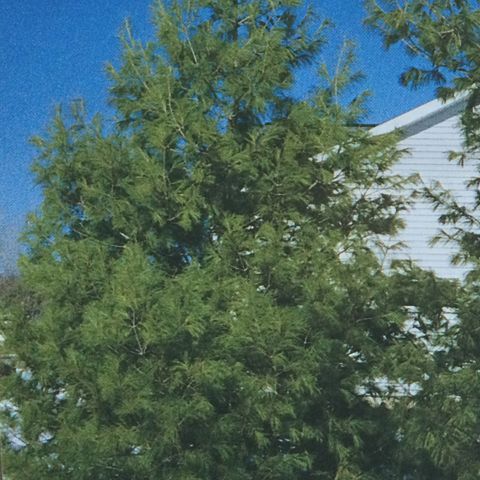
Pine (White)
Pinus Strobus
White Pine, or Pinus Strobus, is soft and plumy in youth and irregular and majestic in old age. Either way, it’s always attractive. Even young White Pines have the gift of appearing full and dense without appearing nearly as stiff or rigid as a Scotch or Austrian Pine. However, since it is a fast-growing tree with a tendency to shed limbs under ice and snow loads, White Pine is not a tree for restricted locations. Use with the knowledge that cleanup of broken, snow-damaged limbs will be a necessary task every spring after the tree reaches mature age. White Pine needles occur in bunches of five and persist for 18 months before abscising. White Pine grows 50 to 80 feet tall with a spread of 20 to 40 feet. Pine Tip Weevil can become a serious problem for young White Pines, killing the terminal bud and causing the tree to become flat-topped and crooked, but this problem can be controlled.
A very worthy tree for the right locations, it is native to the northeastern United States and Canada and is the state tree of both Maine and Michigan. In the 18th and 19th centuries especially, it was a highly regarded timber tree and is still valued for its lightweight, straight-grained wood (orange Heartwood and white Sapwood).
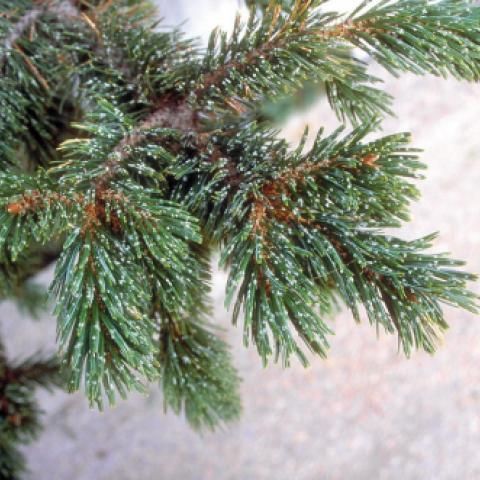
Pine (Bristlecone)
Pinus Aristata
Bristlecone Pine, or Pinus Aristata, is a native of the western United States. Extremely slow-growing, this dwarf, shrubby tree makes an excellent choice either for rock gardens or as a foundation plant. It grows 8 to 20 feet tall. Bristlecone Pine is a reliable, trouble-free specimen plant. The long, blue-green needles grow in bunches of five and tend to be very resinous.
Bristlecone Pines are one of the oldest trees on the planet with specimens ranging from 4,000 to 5,000 years old. They can thrive in very dry, rocky, and inhospitable conditions and tolerate a wide range of soil pH levels.
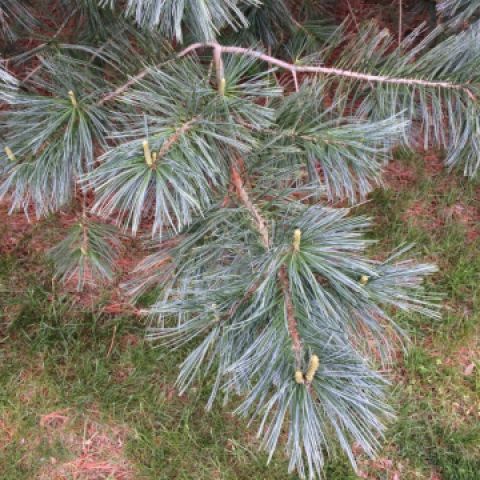
Pine "Vanderwolf"
Pinus Flexilis "Vanderwolf"
Limber Pines, or Pinus Flexilis, are natives of the Rocky Mountains from Canada to New Mexico, and they thrive in the dry, difficult growing conditions often found in that region. These trees maintain their rich green or blue-green color throughout the winter even at high elevations exposed to strong, cold winds. The “Vanderwolf” cultivar grows more slowly with a narrow, upright habit and a mature height of 20 to 30 feet and a mature width of 10 to 15 feet. Their silvery, blue-green needles are closely spaced. “Vanderwolf” Pine trees are excellent medium-sized pines for the landscape.
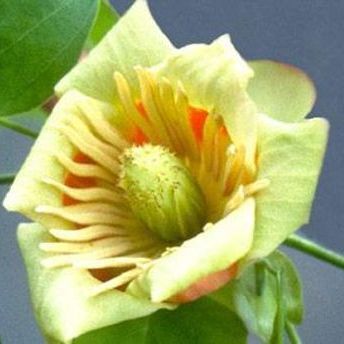
Poplar (Tulip)
Liriodendron Tulipifera
Everything about the Tulip Poplar, or Liriodendron Tulipifera, is big: the leaves, the bold branches, and the tree itself. Possibly the largest trees in the Eastern United States deciduous forest, Tulip Poplar trees are beautiful in youth and grand in old age as the uniformly spaced branches give a full, dense appearance at all life stages. The flowers are attractive, although some people will miss them since they are so far above their heads.
The fall color of the Liriodendron Tulipifera is a pleasant golden yellow. Mature height is usually 60 to 90 feet with a spread of 30 to 50 feet, although many trees grow even taller. The lack of lower branching gives Tulip Poplar trees of all sizes a stately, column-like appearance. Tulip Poplar is the state tree of Indiana, Tennessee, and Kentucky.
Use this tree as a shade tree or specimen. It can also be used in groupings. A grove of Tulip Poplar trees is extremely majestic. For maximum enjoyment of the unmistakable silhouette, place the trees where the outlines are visible above the skyline.
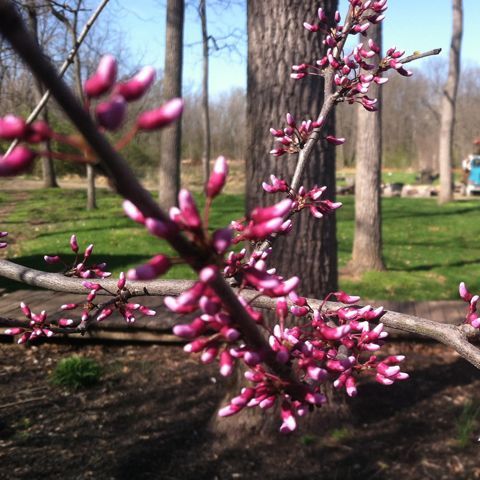
Redbud
Cercis
With a Redbud, the foliage is attractive during the growing season, the yellow fall color can be quite nice, and the reddish bark adds to the ornamental appeal during the dormant season. However, without question, spring is the high point for the Eastern Redbud. Brilliant, purple-pink flowers in profusion create a party atmosphere that begins in early to mid-April and persists for as long as four weeks.
The name Redbud is a misnomer. Neither the buds nor the flowers are red.
In the last 10 years, the cultivars have multiplied. Weeping forms and cultivars with foliage sporting shades of purple, yellow, orange, and variegated white have taken the market by storm. They can't even leave the flowers alone. There's a cultivar with white flowers. (What do you call that? A Whitebud?) While some of these forms are exciting and eye-catching in the formal landscape, the species is a great tree that may blend more naturally in the garden.
At Woodlawn LLC, we also grow “Avondale,” which is a cultivar of the Chinese Redbud. Chinese Redbud is even more gaudy than our native Redbud with rich pink flowers in profusion, covering not only the ends of the branches but also the stems.
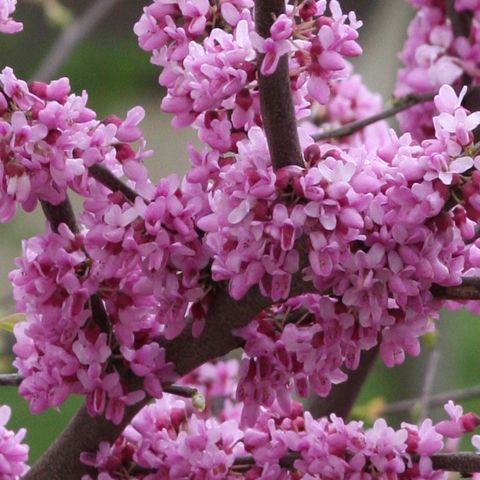
Redbud (Eastern)
Cercis Canadensis
Enjoy the yellow fall color, the ornamental bark, and the attractive, heart-shaped leaves, but save the drum roll for the spring show of the Eastern Redbud or Cercis canadensis! This beautiful pink display can last as long as three weeks in April, and you will want ringside seats. It is spectacular!
Somewhat surprisingly, this plant has neither red buds nor flowers. Stem Canker can occasionally be a problem with the Eastern Redbud. It also tends to be short-lived, usually not living much beyond 30 years. Eastern Redbud grows to about 20 feet high with equal or greater spread under a crown that can be either flat or rounded. Use as a specimen, in small groupings, or as a street tree. The point of an Eastern Redbud is display! For that, it truly has no competitor or equal and will provide enjoyment whether gracing a front lawn in the South or beautifying a roadway in Maine.
The Eastern Redbud is native to eastern and central North America from southern Ontario and the Great Lakes, south to Western Texas and Florida. Plant one today and enjoy!
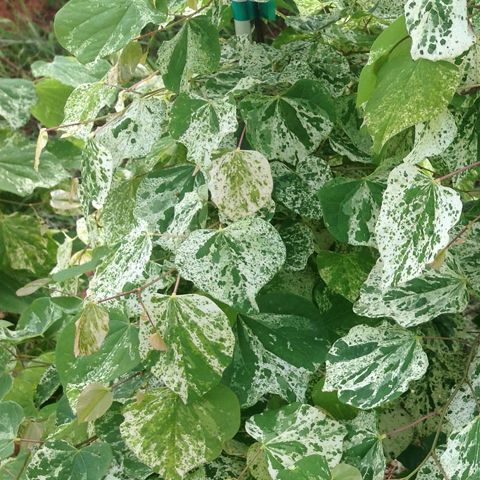
Redbud "Alley Cat"
Cercis Canadensis "Alley Cat"
This is one of those sensational plants. Redbud ”Alley Cat,” or Cercis Canadensis “Alley Cat,” is a striking ornamental with pendulant leaves that appear to be splashed with white paint. Many variegated-white plants will scorch in the sun but not “Alley Cat.” The green-and-white mottled effect will remain crisp and clear throughout the summer. “Alley Cat” was literally discovered growing in an alley in Louisville, KY by plantsman Alan Bush.
As with any Redbud, a bit of afternoon shade will keep the foliage vigorous and fresh and avoid the tired look in the hot summer months. Redbud “Alley Cat” is an accent plant and should be used as such. It looks best at close range. Place it near a walkway, patio, and other such areas. Also, for the best effect, locate the tree where a dark background will contrast with the foliage.
| Container Size | Stem Caliper | Plant Height |
|---|---|---|
| #5 | .75-1.25" | 5-6' |
| #15 | 1.5-2" | 5-8' |
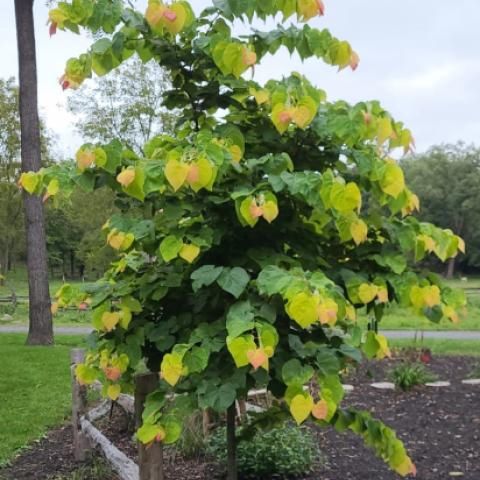
Redbud "Rising Sun"
Cercis Canadensis "Rising Sun"
A tree's foliage can seldom give its flowers a run for their money, especially not when the Eastern Redbud is in focus. However, the leaves on the Redbud “Rising Sun” manage to do exactly that. As the flowers begin to wane, the foliage emerges, starting out as a golden-yellow and giving way to a peach hue. As the leaves change to red, each one takes on the look of the morning sun rising among a green and golden sky. It's a scene that's hard to beat!
The first Cercis Canadensis “Rising Sun” tree was discovered in 2006 by Ray and Cindy Jackson of Jackson Nursery in Belvidere, TN. It was of unknown parentage, had been planted in 2004 from collected seed, and was growing in a row of nursery seedlings.
Like most plants, Redbuds are happiest in moist, well-drained soils but will tolerate moderately difficult growing conditions. Situate the “Rising Sun” Redbud in a prominent place, preferably among darker-colored plants. “Rising Sun” is of medium texture, making it very versatile. It can grow 8 to 12 feet tall and wide.
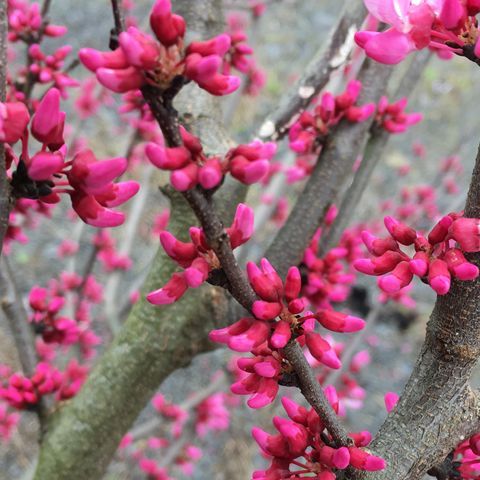
Redbud "Tennessee Pink"
Cercis Canadenis "Tennessee Pink"
The “Tennessee Pink” cultivar of the Eastern Redbud, or Cercis Canadensis, is different in several ways from the species. “Tennessee Pink” Redbud produces red flowers in the beginning stage that open to a clear pink instead of the normal purple-pink color. Like the species, these flowers bloom for two to three weeks in March and April before the foliage emerges.
The fall color is yellow, in contrast to the yellow-green of the rest of the species. The fruits, which are flattened legumes 2 or 3 inches long, mature in early autumn. “Tennessee Pink” Redbuds are also slightly smaller trees than the species Eastern Redbud, growing 15 to 20 feet tall with an equal-sized spread.
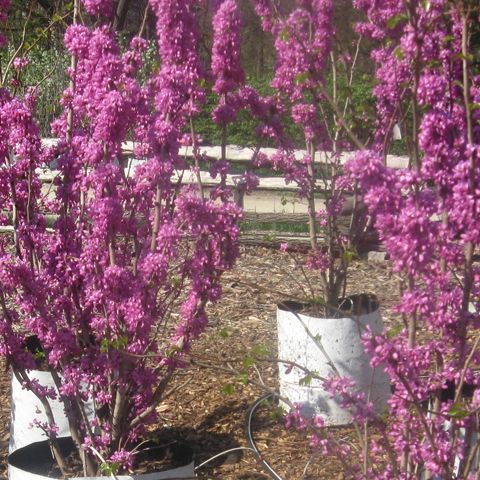
Redbud (Chinese) "Avondale"
Cercis Chinensis "Avondale"
Lovely flowers and lush foliage set the Chinese “Avondale” Redbud in a place by itself. The flowers make a sensational early spring appearance about two weeks before Cercis Canadensis and cover every branch from the smallest lower twigs to the most prominent upper limbs.
This Redbud was discovered in the Auckland, New Zealand, town of Avondale and was first grown commercially circa 1975. Smaller and with a tendency to be more shrub-like than our native Redbud, Cercis Chinensis “Avondale” does not usually grow more than 15 feet tall. Light shade and moist, well-drained soils seem to be its preference.
You can plant the Chinese “Avondale” with confidence. It will almost never disappoint!
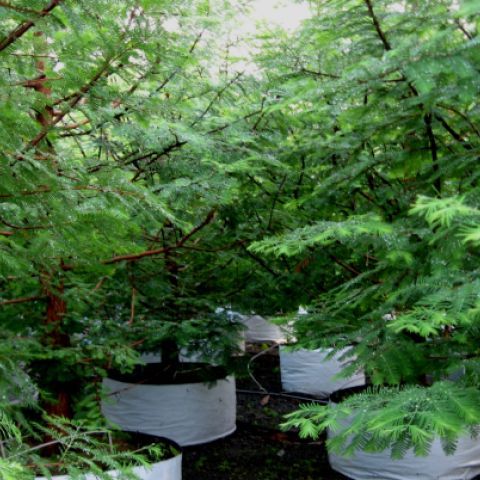
Redwood (Dawn)
Metasequoia Glyptostroboides
Redwood Dawn is about gentle grandeur. With soft foliage, this tree has a fluted trunk and lovely bark with a burnt-orange color in the fall. It’s a great choice for durability since it is resistant to insects and diseases. It’s also hard to damage even in tough storms. All around, this is an excellent tree when planted in the proper location. It’s a fast-growing choice for your property!
Distantly related to the majestic Redwoods of the West Coast, Dawn Redwoods, or Metasequoia Glyptostroboides, will furnish the same aura of grandeur for anyone walking among their feathery, pyramidal forms. Unlike the coastal Redwoods which are limited to high-pressure and moist atmospheric conditions, Dawn Redwoods thrive in eastern North America.
Native to western China and not discovered until 1941, Dawn Redwoods tolerate moist to wet soils and become 70 to 100 feet tall with a spread of 15 to 20 feet. Plant it as a specimen or, better still, in groupings to create your own California forest. The soft, green foliage will blend almost anywhere.
Do allow plenty of room for your Dawn Redwood to reach for the sky. 2 to 3 feet of vertical growth per year under ideal conditions is common.
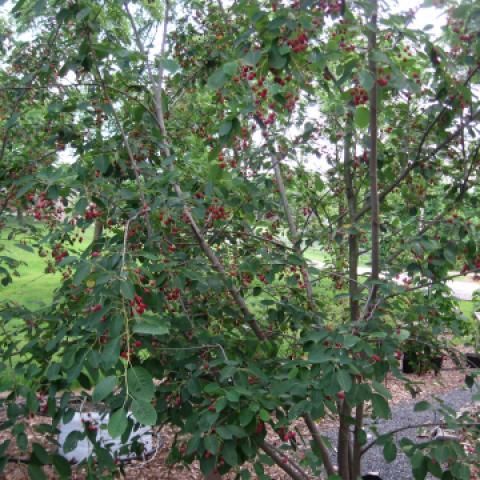
Serviceberry
Amelanchier X Grandiflora "Autumn Brilliance"
A four-season ornamental, Serviceberry or Amelanchier X Grandiflora, kicks off the growing season with a brief but showy display of pure white flowers in April. The attractive summer foliage, along with the tasty fruit, appears in June. The sometimes common name of Juneberry for this plant refers to this fact. The taste of the berries resembles blueberries, and they may be used in jams, jellies, and pies.
The fall color is a spectacular display of orange, red, or a combination of the two and is effective for up to two weeks. The striated bark and branching structure lend winter interest. Serviceberry thrives in partial shade, growing 15 to 25 feet tall with an equal spread. Early pruning to develop structure is beneficial for both the health and aesthetic beauty of the plant. This tree is available in both clump and single-stem forms.
The ornamental attributes are most effective when combined with other plants or backgrounds such as the following:
- An evergreen background to accent spring flowers and autumn color, with White Pines being an excellent choice
- Broadleaf evergreens such as Moonglow Magnolia
- 3Rugged-structured trees such as Burr Oak
- Light-colored masonry background to accent the structure
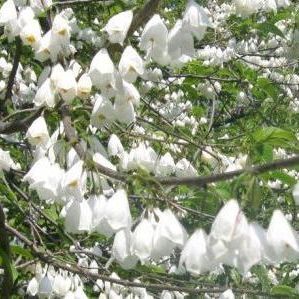
Silverbell
Halesia Carolina
Silverbell's bark is attractive, the fall color pleasing, and the summer foliage sensational, but the lovely, bell-shaped flowers trump all the other ornamental features on this under-used native tree. Flowers persist on the Silverbell, or Halesia Carolina, for 10 days or more, and even after the blossoms fall, they form a beautiful carpet on the ground below.
Native to the Piedmont and southern Appalachian Mountains of the southeastern United States, Silverbell makes a fine understory plant with its tolerance for semi-shade, but Silverbell can flourish in full sun as well if adequate soil conditions and moisture levels are present. It prefers well-drained, acidic soils. Remarkably trouble-free, Silverbell will give you few instances of disease problems although chlorosis is a possibility if the soil pH does become too high. It is a small tree, maturing at 25 to 30 feet with a similarly sized spread. The profile is usually rounded and low-branched and sometimes features several trunks.
Silverbell is one of our favorite small trees at Woodlawn LLC. If you place it against a lawn background, you will be able to enjoy both the spring flowers, which are most effective in front of a green background, and the informal growth habit and winter fruits, which are highlighted by a snow-covered landscape. Silverbell performs very well as a naturalizing plant at the edge of a woodland where the woods provide a dark background for spring floral contrast.
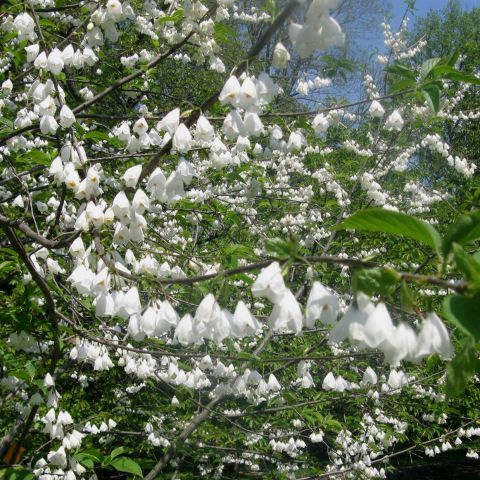
Silverbell "Wedding Bells"
Halesia Carolina "Wedding Bells"
“Wedding Bells” is an improved cultivar of Silverbell with larger but more compact flowers. These flowers are pure white and practically glow in the dusk or early dawn, making them even more distinctive than the already sensational flowers of the species. Like the parent Silverbell, flowers persist on the tree for 10 days or more, and even after the blossoms fall, they form a lovely carpet on the ground below. Also like the regular Silverbell, “Wedding Bells” should make a fine understory plant, tolerating semi-shade but also flourishing in full sun if adequate soil conditions and moisture levels are present. A small tree maturing at 25 to 30 feet, Silverbell “Wedding Bells,” or Halesia Carolina “Wedding Bells,” will give you few instances of insect or disease problems. The fall color is a pleasing yellow like the parent plant.
Place “Wedding Bells” against a lawn background, and you will be able to enjoy both the spring flowers, which are most effective in front of a green background, and the informal growth habit and winter fruits, which are highlighted by a snow-covered landscape. Like the species, “Wedding Bells” performs very well as a naturalizing plant at the edge of a woodland, especially in front of a dark background for floral contrast.
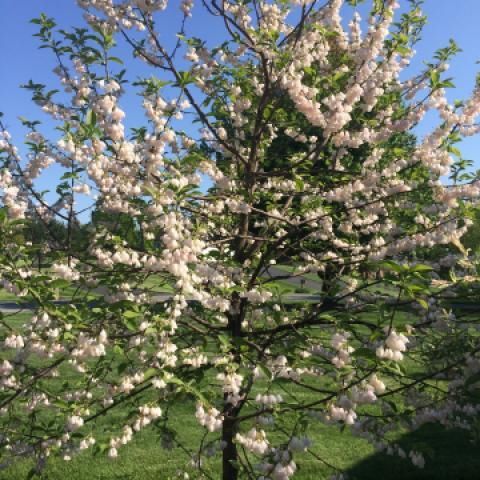
Silverbell (Pink)
Halesia Monticola "Rosea"
Pink Silverbell, or Halesia Monticola “Rosea,” is a delicate spring beauty with an intoxicating look! The bell-shaped blooms are the primary ornamental feature of this medium-sized tree, native to the Appalachian Mountains of Tennessee, North Carolina, and Georgia. The Pink Silverbell is a fine-looking plant the rest of the year as well with its lush summer foliage and attractive winter fruits. Silverbells are remarkably trouble-free with almost no insect or disease problems. The structure of this cultivar tends to be more well-mannered and uniform when contrasted with the White Silverbell. It also requires much less early pruning to produce a symmetrical form. Pink Silverbells typically grow 20 to 40 feet tall with a slightly smaller spread.
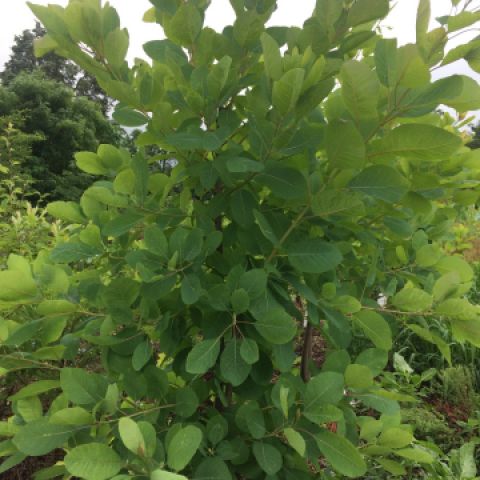
Smoketree (American)
Cotinus Obovatus
American Smoketree, or Cotinus Obovatus, is an ornamental plant in its own right. A tough tree, it grows naturally in rocky outcroppings in the lower Midwest. The flowers are insignificant, but the billowy hairs attached to the elongated stalks of the spent flower clusters turn a smoky, purplish-pink in midsummer, giving the tree a most unusual and attractive appearance. This floral effect is on show for weeks. The soft-green foliage turns a pleasing mid-green in late summer. The American Smoketree exhibits excellent fall color. Actually, it produces some of the best fall colors of our native trees and shrubs with corky bark. It shows a toleration for high pH soils and difficult growing conditions. So why isn't this tree used more? Most plantsman are indifferent and the public is naïve. This tough little performer is one of those horticultural secrets. Plant one and enjoy. It grows 20 to 30 feet tall with an equal-sized spread.
Many gardeners are familiar with the inferior European Smokebushes with their purple and blue leaves, but the gentle, lime-colored foliage of the American Smoketree is easily superior. Show off the foliage by planting it among and in front of plants with darker-colored foliage. Flowering on the Smoketree occurs in mid-summer or late-summer. Use it to liven up the tired, season-worn landscape. American Smoketree has a medium texture that allows it to blend with a wide variety of other plants.
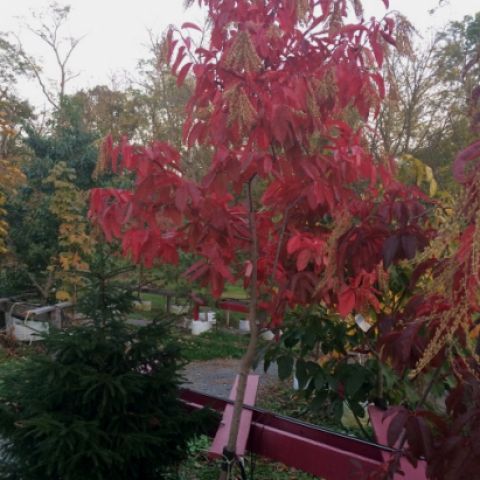
Sourwood
Oxydendrum Arboreum
The Sourwood, or Oxydendron Arboreum, is an understory tree, native to the southern Appalachian Mountains, where it is perhaps most commonly found growing on rocky, wooded slopes along with other heath family members like azaleas and rhododendrons. The drooping, cream-colored summer flowers are, however, unique to this sole member of its genus. The brilliant red fall color is as reliable as it is outstanding. Sourwood puts on every fall a display unsurpassed by any other native small tree! The bark is also interesting, exhibiting a corky texture somewhat similar to the Black Tupelo's but more pronounced. This tree requires well-drained, acidic soil and grows 15 to 30 feet high and 10 to 12 feet wide.
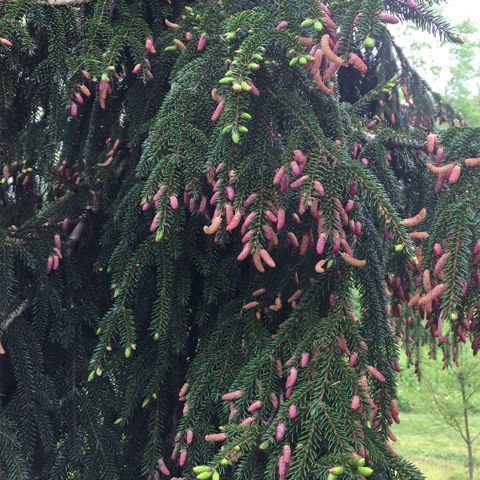
Spruce
Picea
The Spruce genus comprises possibly the most widely planted group of landscape evergreens with screening, sheltering, ornamental, and accent applications. Spruces are large trees, many of them growing to well over 100 feet tall in their natural habitat. Many cultivars have been developed for both size and ornamental attributes, and almost every landscape can make a Spruce feel at home. Spruce trees are adaptable plants and survive in most landscapes. In fact, it takes less time to tell what a Spruce will not do than to list all the things it accomplishes easily! Most Spruce trees do not accept poorly drained soil with the exception of a few northerly species such as Black Spruce, which grows in low, wet environments in boreal forests. Some Spruces are sensitive to humidity, most notably the Colorado or Blue Spruce. While Blue Spruce is a beautiful tree in the garden center and garners many sales, it is susceptible to fungal disease in humid environments. At Woodlawn LLC, our favorite is Oriental Spruce with its glossy, dark green foliage, classy habit, and attractive flowers. This tree is absolutely gorgeous after a snowfall when the white snow accents the dark foliage. This tree exhibits the shortest needles of all the Spruces, and the foliage makes beautiful decorations.
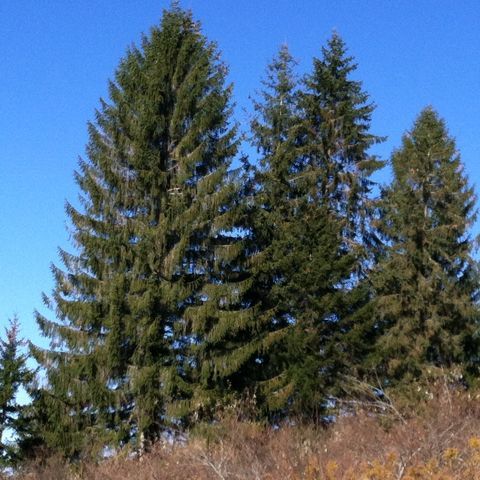
Spruce (Norway)
Picea Abies
Norway Spruce, or Picea Abies, is a large, fast-growing conifer that holds its color well throughout the winter and is probably the most popular evergreen. Branchlets do become pendulous as the tree matures. The texture of the young tree is fine to medium but becomes coarser as the tree matures. This tree can be used alone as a specimen or in groupings. An adaptable conifer, Norway Spruce tolerates clay soils and marginal growing conditions moderately well. When choosing a planting location for this tree, be sure to allow plenty of room for fast growth. Mature height is 40 to 60 feet with a spread of 25 to 30 feet. Norway Spruce is native to the mountains of northern and central Europe east to the Urals and is probably the most widely planted evergreen.
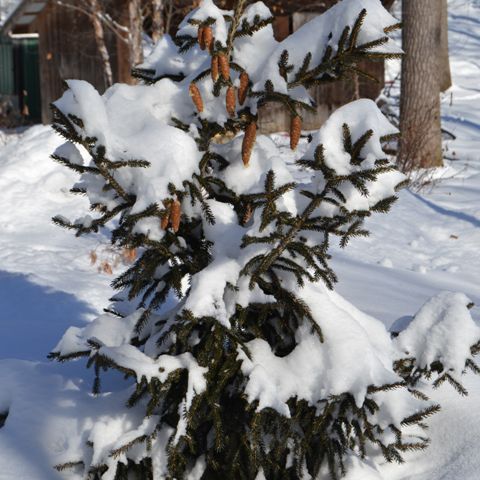
Spruce (Oriental) "Gowdy"
Picea Orientalis "Gowdy"
Selected from the graceful Oriental Spruce, “Gowdy” is, unsurprisingly, a first-rate ornamental. Three characteristics separate the “Gowdy” Oriental Spruce, or Picea Orientalis “Gowdy,” from the rest of the species: smaller size, informal growth, and slate-grey stems. The literature puts the mature height at 8 feet to 10 feet, but we suspect that it will usually exceed that. The foliage emerges a soft, light green and matures to a rich, dark green. This tree, like the species as a whole, tolerates shade better than most Spruces. Very pleasing in snowy winter, “Gowdy” is a lovely specimen plant for small spaces.
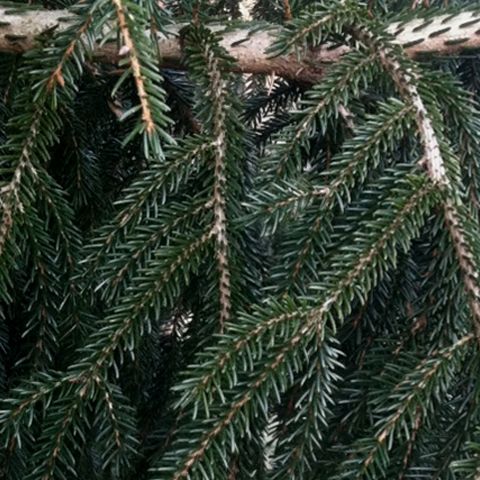
Spruce (Oriental)
Picea Orientalis
This is an evergreen with a very pleasing personality. Fine-textured with a dark green color, this is possibly the most refined Spruce. The new foliage is light green and contrasts beautifully with the older needles. Oriental Spruce makes a wonderful addition to the winter landscape with its dark green needles contrasting strikingly with a fresh snowfall. The foliage also makes an attractive addition to interior decorating. The obvious use for this outstanding tree, growing 50 to 70 feet tall, is as a specimen. Native to mountain areas from the Caucasus to Turkey, Oriental Spruce tolerates difficult growing conditions quite well.
One of the most beautiful formal conifers, Oriental Spruce is most often used as a specimen in prominent locations, although mixed use is another excellent option. The best companion plants include the following:
- Black Tupelo, American Hornbeam, Sweet Birch, or Manchurian Maple for enhancement of fall-color effect.
- Japanese Cornel, Silverbell, or Serviceberry for enhanced spring floral effect
- River Birch with Oriental Spruce as a backdrop for enhancement of River Birch's white-colored or salmon-colored stems
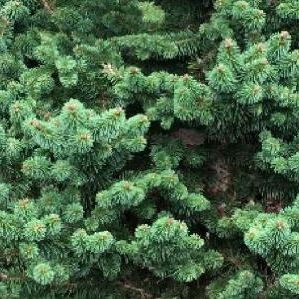
Spruce (Suncrest)
Picea Abies "Suncrest"
A cultivar of Norway Spruce, “Suncrest,” or Picea Abies “Suncrest,” is a dwarf cultivar selected by a local plantsman, Greg Gulden, of Mount Holly Springs, PA. The habit is very tight and compact in contrast to the parent plant, which develops a large, open crown. The foliage color is a rich, dark green. The outline is conical and the size is predictable, yet irregular enough to give it a relaxed appearance. This is a versatile plant. It's compact enough to be used in small landscapes or even as a foundation plant and makes a great Dwarf Alberta Spruce replacement both in appearance and culture. “Suncrest” Spruce also makes a great accent plant.
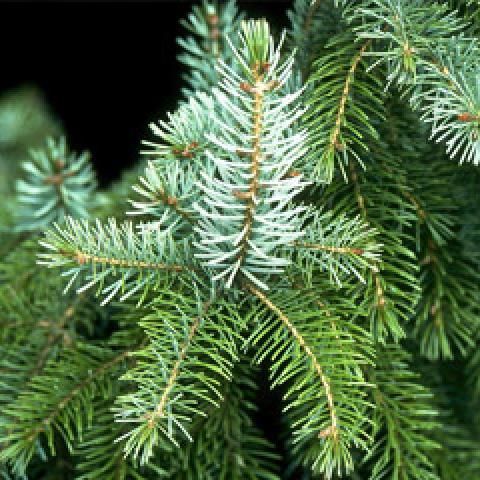
Spruce (Serbian)
Picea Omorika
Graceful and almost delicate in form, the Serbian Spruce, or Picea Omorika, is one of our favorite Spruces At Woodlawn LLC. The architectural structure gives this tree a very regal appearance. The pendulous branches curve upward at the ends in a graceful manner. New growth is a soft, light green, maturing to an attractive blue-green. The purple flowers are subtly alluring.
Although native to Eastern Europe, Serbian Spruce is a highly adaptable tree with good urban tolerance. It grows 40 to 60 feet tall with a spread of 15 to 20 feet. Although it can be used in any setting, the Serbian Spruce's real beauty shines forth when the tree stands alone as a specimen tree, highlighting its beautiful silhouette. When planted with other deciduous trees, however, in screens or groupings, the Serbian Spruce's form and foliage do make a wonderful accent for the brilliant autumn color.
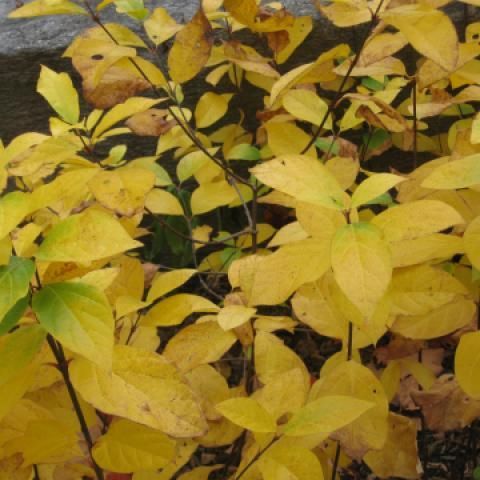
Sweetshrub
Calycanthus Floridus
Sweetshrub is unassuming, comfortable, and attractive. Somehow Sweetshrub, or Calycanthus Floridus, fits anywhere. Put it next to the stone wall, along the border to the patio, or as a foundation plant. In the scurry to place gaudy sensations in the landscape, homeowners and landscapers have overlooked the Sweetshrub's calm, solid performance. In the past, the leaves and flowers of this plant were used to provide a freshener for the insides of clothes drawers and women's purses. The foliage also makes a fine addition to potpourri. The cultivar “Michael Lindsey” has glossier foliage and more fragrant flowers. The fall color is a beautiful yellow. Sweetshrub tolerates occasionally wet soil yet withstands drought moderately well. It can supposedly grow to 8 to 10 feet, but in our garden, Sweetshrub only reached 3 or 4 feet high with a spread of 6 to 8 feet. A native of the southeastern seaboard from Virginia to Florida, Sweetshrub is also commonly known as Carolina Allspice, in reference, of course, to its fragrant scent.
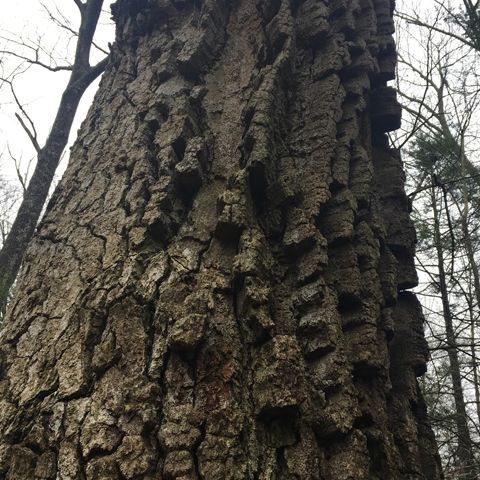
Tupelo
Nyssa Sylvatica
They're tough and durable. They can thrive in poorly drained soils as well as dry uplands. Soil compaction? Not a problem. Black Tupelo is not only a dogged performer but also a beautiful addition to almost any landscape. The most outstanding feature is the foliage: glossy, dark green in the summer changing to a stunning array of orange and red hues in the fall. Another attractive feature is the horizontal branching which, with a little creative placement, can make an appealing statement in the dormant season.
The longevity of Black Tupelos is remarkable. There are living specimens that are hundreds of years old.
Overall, Black Tupelo is a great tree in its own right, but cultivars have been gradually developed in the last 20 years, producing even more trees that lend the perfect touch. Even so, if you're looking for a natural and informal addition to your garden, the species is still best. The cultivars work best in formal landscapes such as specimens and when planted along walkways.
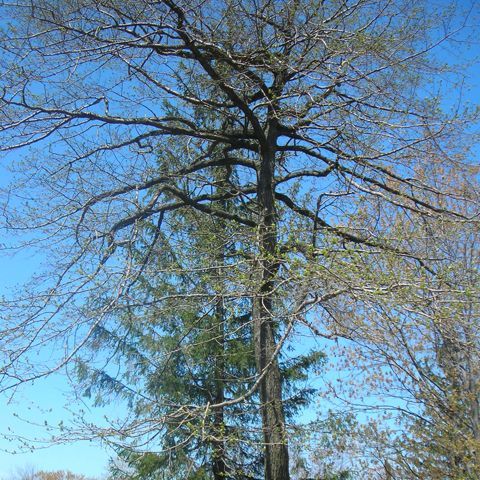
Tupelo (Black)
Nyssa Sylvatica
Black Tupelo, sometimes known as Sour Gum, is a very refined native when properly placed. The small, greenish-white flowers in springtime give way to oval fruits that are 0.5 inches long and technically edible although quite sour (hence the name of Sour Gum). The fruits ripen to a dark blue and are very attractive to birds and wildlife. The foliage, glossy in the summer, exhibits spectacular yellows, oranges, or reds in the autumn. This tree usually maintains a strong central leader with horizontal branching. A dogged performer, it can handle a wide range of growing conditions. Black Tupelo, or Nyssa Sylvatica, is a long-living tree. Individuals several centuries old exist today. As mentioned, Black Tupelo can be situated in a wide variety of locations in the landscape. The horizontal branching is often used to stabilize solid backgrounds. Slow-growing, Black Tupelo usually reaches 40 to 50 feet in height with a spread of 20 to 20 feet. Purchase one at Woodlawn LLC today and bequeath its beauty to future generations!
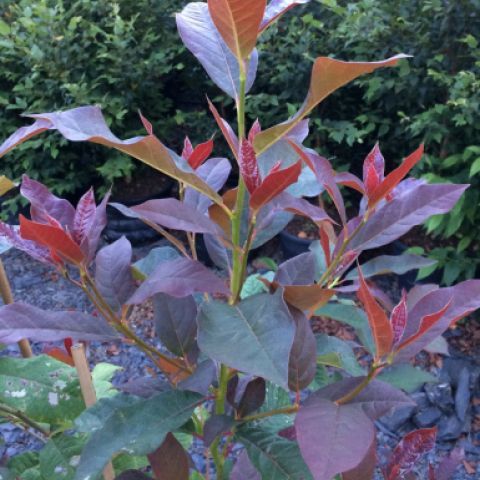
Tupelo (Black) "Wildfire"
Nyssa Sylvatica "Wildfire"
Black Tupelo is a beautiful native landscape tree known for its exceptional fall color. The cultivar Black Tupelo “Wildfire” offers an exciting addition with its reddish new growth adding splashing color to the summer landscape. Foliage matures to a rich, glossy green, resistant to fungal diseases. During the dormant season, the horizontal branches produce a layered outline. Hardy and resilient, Black Tupelo “Wildfire,” or Nyssa Sylvatica “Wildfire,” tolerates urban soil environments quite well provided the pH is not too high. The growth rate is slow to medium. Black Tupelo grows 40 to 50 feet high and 20 to 30 feet wide.
To showcase Wildfire’s new growth, avoid planting the tree among or in front of dark-colored objects or trees. American Smoketree, with its lime-green foliage, makes a wonderful companion plant. With its strong, horizontal branching, Black Tupelo's structure will serve as a visual anchor in the garden. The structure makes an excellent silhouette in the dormant season so, if possible, plant where the outline is visible above the horizon. This also allows the blue sky to serve as a perfect background for the brilliant fall color.
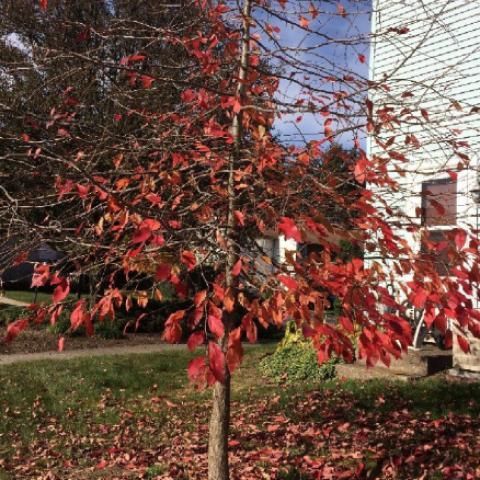
Tupelo (Black) "Green Gable"
Nyssa Sylvatica "Green Gable"
This is one of our favorite cultivars for Nyssa Sylvatica at Woodlawn LLC. Black Tupelo “Green Gables” has all the positive attributes of the species: tolerance of tough growing conditions, excellent fall color, horizontal branching, and more. The differences are as follows: even glossier summer foliage, brilliant red fall color, and a pyramidal form, hence the name “Green Gable.” This also gives it a perfect silhouette in winter. Truly, a four-season performance is on offer.
This tree will tolerate a wide range of soils: wet and poorly drained, dry, clay, and compacted. Because of the consistent pyramidal form, Black Tupelo “Green Gable” makes a lovely “Allee” or can fit any other situation where a formal appearance is desired. Like the species as a whole, “Green Gable” grows 40 to 50 feet tall with a spread of 20 to 30 feet.
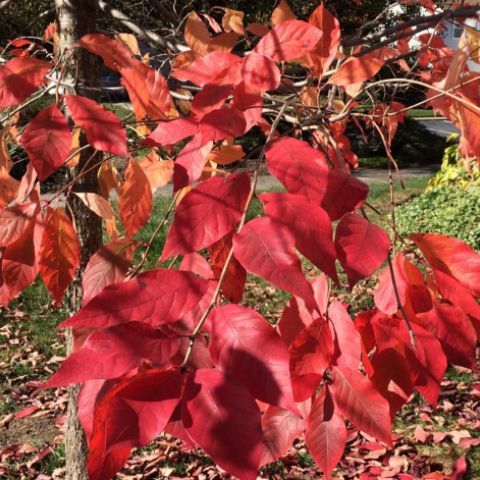
Tupelo (Black) "Red Rage"
Nyssa Sylvatica "Red Rage"
Black Tupelo “Red Rage” is at home in almost any landscape. Like all Black Tupelos, it has a strong central leader with horizontal branching that rarely sustains storm damage. A dogged performer, it can handle a wide range of growing conditions from poorly drained soil to dry. Black Tupelos are also long-lived trees with centuries-old individuals to prove it. Black Tupelo “Red Rage” is an improved cultivar with clean, glossy summer foliage and brilliant red fall color.
Growing 40 to 50 feet high with a spread of 20 to 30 feet, Black Tupelos can be situated in a wide variety of locations in the landscape. The horizontal branching is valuable for stabilizing solid backgrounds.
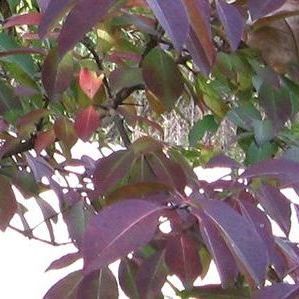
Viburnum (Blackhaw)
Viburnum Prunifolium
One of our most resilient native small trees, Blackhaw Viburnum, or Viburnum Prunifolium, thrives as an understory tree or along the edges of woodlands and successfully competes with some of the most notorious invasive plants such as Bush Honeysuckle. Tolerant of high pH and clay soils, Blackhaw Viburnum can handle either full sun or partial shade. It usually reaches a height of 12 to 30 feet with a spread of 6 to 12 feet. It can also be quite ornamental with its snow-white panicles of flowers and glossy, disease-resistant foliage that often turns a beautiful wine-red in the fall. The interesting bark reminds one of alligator hide. If used as a specimen, Blackhaw Viburnum may require considerable training as some trees develop renegade growth habits. In autumn, the white, non-fragrant flowers change to blue-black, berry-type drupes that, in many cases, persist into winter and remain quite attractive to birds and wildlife. These fruits are also edible. They may be eaten off the bush when ripe or preserved in jams or jellies.
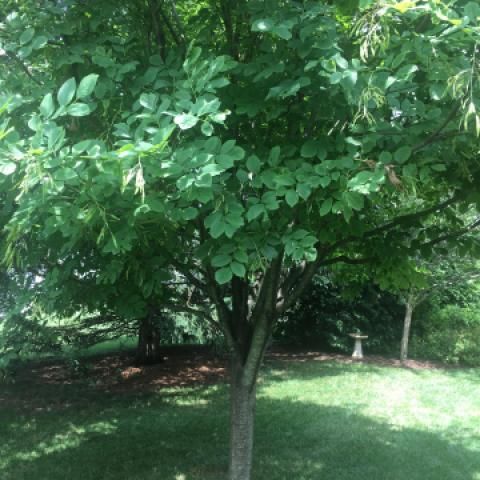
Yellowwood
Cladrastis Kentukea
The American Yellowwood, or Cladrastis Kentukea, is a low-branching native shade tree exhibiting a broad, rounded crown and a trunk that strongly resembles a beech tree with the same smooth, gray bark. This tree puts on a spectacular display every third year in May and June. It appears to be raining creamy white flowers that are 8 to 14 inches long! These beautiful flowers stand out among the pea-green summer leaves that take on a yellow to golden-yellow fall color. The American Yellowwood grows 30 to 50 feet high and spreads 40 to 55 feet wide. The heartwood is yellow, hence the name. Native to limestone cliffs, it nevertheless tolerates a wide range of soil conditions from high pH to acidic. Although it is unfortunately not very common anywhere, American Yellowwood is a choice shade tree for small properties. Plant one today and enjoy!
"And out of the ground made the Lord God to grow every tree that is pleasant to the sight..."
We had Woodlawn LLC trim some trees at our home a while back. Pricing for the services provided was very decent. We will definitely use his services again.
- Jessica K. via Google
Learn More About Woodlawn LLC
Located at 3171 Ritner Hwy, Newville, PA. Woodlawn LLC specializes in trees, tough trees, native trees, and tree care services. Certified arborist. 30+ years of experience. Competitive prices. Call now.
serving Area
Newville, PA
New Paragraph


Share On: